#i think its a good game- just a bad sequel
Explore tagged Tumblr posts
Text
Mafia Sports Melodrama: The Sequel
Which is really a sequel trilogy to All for the Game but only the first two are out, so that's what I'll be reviewing.
Much like the first trilogy, melodrama is the name of this game. Accept it or leave. And I love it, because while it's flawed, it's not a bad series. People are drawn to it for the same reasons people are drawn to melodrama in general: it reveals emotional realities and contrasts them with possibilities about the limits of humanity, and that is inherently fascinating.

I really enjoyed Jean's development, and his inner monologue. The prose has improved quite impressively from the original trilogy, and it's especially noticeable in how Jean's POV is written. Intrusive thoughts are intrusive. Comforting thoughts are punctuated to show peace and calm.
Jean is of course the essential wooby who has been through everything from waterboarding to human trafficking to assault. But his self-hatred and non-existent self-esteem make sense and again, like with Andrew's issues in the first trilogy, feel real from a viscerally emotional standpoint. No matter how dramatized it is, no matter how hyperbolic, there are elements of true humanity in there that allows the author to explore the limits of the human capacity for healing.
I was also truly drawn to Jeremy as a character, which I wasn't expecting. Listen, sunshine boys are not usually my favorite archetype. But his complicated background was genuinely interesting and heartbreaking. Essentially my thoughts on JEremy are summed up here:
“...they’ve always brought out the worst in me.” “It makes you more interesting,” Jean said... “Not your capacity for unkindness, but how fiercely you fight against it.”
Jeremy's backstory involving politics and law enforcement also felt, well, fitting for today. Prescient, if you will, despite being set in 2007. And the way his family's cage holds him back is intriguing because it mirrors Neil's predicament in the first series (also Nicky's).
Both are captives of their families. Jeremy stays at home and tries to be a good son, knowing at a deep level he will never be accepted. Neil was on the run from his family, but he knew he couldn't run forever. But both of their fathers--or stepfather, in Jeremy's case--ultimately want to take them apart at the seams for ruining their image.
The power they wield they use for petty grudges and sadism. The ultimate reality is that politics, despite its shiny exterior and inviting cameras, is run similarly to the mafia underworld. Which. Well.
I also think Jeremy's struggles with self-esteem foil Jean's in interesting ways. Unlike Jean, who was abused and self-harms, Jeremy mixes pleasure with self-harm. He sleeps with people who, as Laila accurately points out, degrade and even harm him.
“Would it kill you to fuck someone who respects you?”
Look, degradation is fine if that's what you're into, but it's pretty clear Jeremy is not into it. His conversation with Ivan (whose name is literally Jean but in Russian, by the way; yes the names were meaningful here too) was pretty clear that Jeremy doesn't like being insulted but hasn't the self-esteem to walk away.
“...we both know you’re a shameless slut.” “Says the man who invited me here,” Jeremy said, cool enough that Faser laughed. “Can’t make up my mind. Either he’s as a big a whore as you are, or the Ravens are using your history to destroy his reputation...” Jeremy pulled Faser’s hand free. “I didn’t come here to gossip about Jean. If that’s all you want from me, I’ll just leave.”
If Jean realizing how wrong what was done to him was hits him only through seeing it through Elodie's suffering and through others, then Jeremy also is being warned to realize how wrong what he's doing to himself is when he's angry that Jean is being slut-shamed but accepts it as the best he deserves.

Side Characters
I know Riko is dead, but I did enjoy the humanizing note that while Riko would like to have killed Wymack, he couldn't do it because there was a part of him that desperately wanted a father, and he couldn't take that from Kevin. I maintain my interpretation that Riko had a ton of internalized homophobia thanks to his family that he directed into torturing Jean. The man's feelings for Kevin are barely even possibly platonic, and the only reason they are is because Riko clearly sees Kevin as a replacement for Ichirou, and Kevin leaving (even though he needed to leave) reinforces that abandonment idea. Dude was awful but is still tragic.
Coach Rhemann is wonderful. I liked that he turned out to be queer too, showing Jean that there is nothing wrong with him and that he can find love. The scene where Jean breaks down in his arms is very Good Will Hunting, but also very beautifully done. He and Wymack are amazing dads to their teams, even if they have very different perspectives and personalities.
While it's true that the sprawling cast means a lot of the Trojans are merely names--even among the 'floozies'--they are all likable. Cat and Laila are of course the standouts. I adore their friendships with Jeremy and with Jean, and much like Dan and Matt's relationship, even though they are an established couple with little drama, they have enough chemistry and development to make the reader root for them as a couple.
I also really loved Lucas's character, despite in initially disliking him, and I love Cody. Though Cody's throuple situation is something I'm apathetic about because we just don't know enough about Pat and Ananya and what they bring to Cody's life for me to root for it or against it. Tanner is adorable, as are Derek and Derrick (rooting for Cherise too!). I quite like Xavier too, but again, I wish we got a tad more from Min to see what the core of their relationship is like--kind of like we did for Seth and Allison, or Aaron and Katelyn. Even if neither got a major focus, they got something. Xavier/Min and Ananya/Pat are just names at this point.
Critiques
One critique I have related to the "timeliness" aspect is that it does read like a 2025 novel set in 2007. Which it is, but it's a noticeable difference from the original trilogy, which was published in like 2013 but captured exactly what 2006-07 American culture was like, specifically in regards to phone usage. Here there are a few too many reliances on text messages and emojis and such for me to entirely see it as authentically 2007. However, this doesn't detract from any of the novel's strong points, so it doesn't really matter.
Another critique I have is related to Nathan's "trial." That's just not how the legal system works, because the dude is, like, dead. They're not going to try everyone involved all at once. A grand jury, maybe, but that's not a trial. Okay, okay, I get that colloquially they're calling it his "trial," but yeah lol.
But "how things work" has never mattered in this universe, and frankly a lot of the stories I love most don't rely on that either. So yeah, it's a foible. Oh well.
For The Broken Cage:
I really need to see Bryson face a confrontation--there's been a ton of build-up in conflict between him and Jeremy. It has to explode at some point. I also want to see Joshua. He's the only sibling of Jeremy's who hasn't really appeared, and we know he was extremely close with Noah.
I want to see Joshua and Jeremy work it out if possible, but he's still such a question mark I'm not sure where Joshua is going. However, I do want Jeremy to tell off the rest of his family and for William to quit on Jeremy's way out the door. He needs to choose Jean over them, and I believe he will.
For Jean's part, I do want Jeremy to find out exactly what Zane did to Jean in terms of betrayal. I'd also like him to find out Jean was sold to the Moriyamas, and the waterboarding to be revealed too... and maybe for Jean to make some progress in overcoming his fear of water, but that can only happen if he's upfront with Jeremy about what caused the fear.
And, I want to see Jean tell Jeremy about Elodie. Of note, it's most likely she's dead but... no body no death, and that's a common trope in mafia stories.
Lastly, I need a sex scene between Jeremy and Jean. Sex is a major factor in both of their traumas, and I would like to see them start healing together.
I don't know if I want to see the Trojans winning the championships... mainly because I don't want to see the Foxes lose lol. But I'm open to it! Sorry Kevin, I have chosen my colors and they are orange and white.
Kevin Duology
But speaking of Kevin...
I quite liked the set-up with Kevin's budding alcoholism. I really want this to be a focus in a coming Kevin duology, even if I think one is a prequel and one is a sequel. I presume the sequel would be the one addressing this, but it's significant enough of a problem in The Golden Raven that it has to be addressed.
And maybe we'll get a flashback to the scene of Kevin telling Wymack he's his dad because I need that.
But related to looking forward to Kevin's story while also reviewing Jean's trilogy...
Are we supposed to like Thea Muldani? Because I want to like her. I was excited to see a character with a Sindhi surname (she's described as Black but biracial with a Black mom, and I'm assuming her father is South Asian given the name?). I don't even dislike Riko, who is objectively the worst!
I just... don't. I'm not even apathetic to her; I dislike her. And it takes a lot for me to dislike a flawed female character. Before starting Jean's series, I saw a ton of hate for her, and I chalked it up to people being grumpy about their ships and the like, plus some misogyny and racism. Which still is likely a factor, to be clear.
Just--in neither of the three scenes she's appeared in, one per book, has she given me the remotest reason to like her as a character, much less to root for her and Kevin together. The first scene in The King's Men was kind of cute, but told me nothing about her, so much like the Cody-Ananya-Pat situation, I was apathetic but optimistic about learning more.
Then we get the two scenes in Jean's stories and hoo boy.
Andrew at least had his loyalty to Kevin early on; Aaron had his protecting his brother. Thea has had no 'save the cat' moment at all. Her anger at Kevin for shutting her out in the original trilogy was fine, but it was neither here nor there for establishing their relationship dynamics or her character stakes. And if the author intends for them to end up together in an eventual Kevin duology, I frankly think it'll be too late even if she's given a great redemption arc. These two scenes are very hard to come back from.
I'm also not against a het relationship in this series, and I do think a lot of fandoms wherein series have m/m relationships have, er, hate boners for female characters that are completely nonsensical. I was actually initially disappointed that Renee and Jean didn't work out, and I loved Dan and Matt, and even Allison and Seth in their short story.
But there is zero reason to care about Thea at this point and a lot of reasons to dislike her. Her entry is literally victim-blaming Jean for being assaulted. Her second scene in The Golden Raven is even worse. I get that Kevin is using her to destroy the image of the Ravens, but for pity's sake, her words cost THREE people their lives. Three! Are we supposed to assume she didn't know that was a risk, when Jean knew it? Are we supposed to assume this will make her doubt the Ravens' methods, when the previous string of suicides and attempts didn't give her pause?
Look, I do think Thea is very, very clearly a victim of brainwashing. As someone who grew up in a cult, I've met Theas before. I am interested--very interested--in a potential redemption for her. That could be a mega-compelling story. But it would have to be the main focus of the story, and I honestly don't know what it would take to get me to root for her and Kevin to end up together, or if that's even possible. It's kind of too late?
Idk, I know that the author's talked about how things have changed and such from her original drafts, and we can see a few modifications to the material in the Extra Canon content in Jean's trilogy. I'm hoping she reconsiders Thea ending up with Kevin, because sometimes what you intend to write just doesn't work. And I don't know if this can work.
All that to say, I do think there's probably an element of misogyny and even racism in Thea's hate train, but she is also just a very poorly done character at this point. Even just having her in the background of Kevin's novel wouldn't work at this point, because the author's written herself into a corner with Thea. The only way to handle her is have a brutal, soul-searching redemption, and even then it might not be enough for people to accept a relationship.
#hamliet reviews#the sunshine court#the golden raven#jerejean#jeremy knox#jean moreau#cody winter#catalina alvarez#laila dermott#kevin day#aftg#all for the game#thea muldani
35 notes
·
View notes
Note
aitsf + 20, 11, and 9 for the violence ask game
9. worst part of canon: i don't want to say all of aini because that's mean and some parts of it were very good (i would die for ryuki and tama). so i'm gonna go with a toss-up between every time uchikoshi is unnecessarily horny (this includes most characters' treatment of iris and excludes everything tama has ever said) and kaname date's entire character and storyline in aini. making a big deal out of his disappearance only to reveal that he was just in atami and an amnesiac for six years is stupid. having his appearance stay the same because he "had a silicone mask of saito's face" is stupid. everyone had wild pre-release theories on how date could still be in saito's body and nearly every single one of them is more interesting than the truth. this is only the first question and it's already getting so long and i don't care. his entire treatment of aiba and mizuki. he lost aiba in the resolution route, she was the one who made him whole, and you expect us to believe that he'd get into a genuine fight with him and they'd separate? it's like the writers forgot that he's actually a genuinely compassionate person underneath all of his old man bickering. it's why mizuki route works so well- and speaking of mizuki, we were absolutely robbed of a proper reunion in aini. all we got was a poorly timed "welcome home" that was immediately followed up with another porno mag joke. because date's just the porno mag guy, we can't have him show any other emotions for too long or the game will explode. i'm going back to the mask thing real quick- it could've at least been interesting if they went into it as him preferring saito's face to his own. but they didn't. just a "ohhh the ladies like this one more" boy shut UP. i hate you pandering to new fans and defeating the point to a sequel. i love you version of aini that lives only in my head. oh god this is still only the first question. i'm so sorry chey
11. number of fandom-related words you've filtered: okay this is easy. i don't need to write an entire essay. only three- 2zuki, dateryu, and ryudate. 2zuki because it's fucking gross, and the ryudate tags because a lot of the fans are annoying and i don't think date would reciprocate. he's bagged the ultimate milf he doesn't have time for some twink
20. part of canon you found tedious or boring: hmm. well if we're going for boring i could say date's character in aini BUT i already wrote a whole essay on that so i'll pick a different answer. a lot of mizuki's side in aini was kind of boring/disconnected. i know in hindsight this is because half of the time you're not mizuki, you're bibi, but when you're playing for the first time you don't know that, and it makes mizuki seem watered down and bland compared to ai1. you have to withhold a lot of information from the player to pull off the timeline twist, and while it works, it comes at the cost of mizuki's characterization. she feels a lot flatter in aini because we're locked out of so much of the narration. the same can also be said for bibi, and we're locked out of even more of her true thoughts since the game misleads us into thinking she's mizuki. the result is that mizuki doesn't feel like herself, and we don't truly get to experience bibi's thoughts. i like bibi but her execution left a lot to be desired
wow that's over 500 words. sorry i have an illness
#ask game#beepiiboop#midi.txt#i realize most of this is me ragging on aini#so for the record i dont hate it#i think its a good game- just a bad sequel#but it definitely improved on a lot of things#especially ai1s ableism#aini spoilers
6 notes
·
View notes
Text
Finished Apollo Justice
I'm fine
#the sheepy speaks#first time playing this game so so legally#before the remake is coming out coz i will buy that bitch lmao#because its the aa game my friend thinks most fondly of#and as a mystery enjoyer and certified ''loves 2d art'' person#i understand now#its pretty even where its clunky#its one of those ''id rather play a bad game for a good story'' games#and its not even that bad#its just a little repetitive in places with some obtuse investigations sections#the story was top-notch#the characters were good#the returning ones felt like natural continuations of their prior existence#i also love apollo like a son#anyway uh...seeing The Skull genuinely had me needing a moment to recover#i think leaving it as open-ended as it did in some regards makes it a good mystery in its own rights#i also am so sad there wasnt another game with apollo in it /s#(my friend laments the unfortunate chronic retcon disease polly is suffering from and im...sad ig?)#sometimes games dont need sequels and sometimes...sometimes........#anyway aa4 is a p fun little game and i love it bunches#and i cant wait to play turnabout serenade again in hd /s
5 notes
·
View notes
Text
I think the Kirby series deserves another anime, but I struggle to identify what exactly I'd want from a new adaptation. The original is what it is, y'know, I don't feel too strongly like it committed any egregious sins against the franchise. Dedede's characterization... I get the need for a Typical Villain and I don't think there were many good characters (then or now) to get for the mix of Comical and Reliable you need for a serialized show (the way Bowser, Eggman, or Team Rocket worked for their series). It's definitely sad to see him have such a wildly different character that weighs him down the way it does, but I can't think of an Easy Fix. And that doesn't even touch on the way Game Dream/Pupupuland and Anime Dream/Pupupuland differ in their setting, or the way any dub would have to find a way to Exist when people are gonna compare it to the 4Kids dub. Love it or hate it, it was Something, and any dub would have to choose if it wanted to take inspiration or go its own way (both with their own risks). And then you contend with the existence of the anime original characters.
Honestly, I'd probably say my ideal pick would be a Remake (I guess in the vein of Adventure/Nightmare in Dreamland or Return To Dreamland/Deluxe type of update?) Keep the basic characters and story roughly the same, probably tweak the setting so it's a bit more game like, and focus on something that feels similar but takes account of the general series progression and works with that (even if not everything in the game gets adapted, at least picking and choosing from what the games offer)
#It's kinda hard to think Abt this just because of like. Idk abt the Kirby animes rep in Japan so I cant really. Say anything Abt that#But 4kids- here and in general- was just such a Cultural... Idk what to call it. It's an Icon but not because it's Good#It's not quite ''so bad it's good'' but it's also deeply flawed on so many levels and ppl get that#But Id confidently say that u can't recapture the absolutely Wild energy they added to things.#Like obv the pokemon anime still went on a got dubbed and was fairly well received. But the way 4kids went about it...#Obviously it would still be popular but. They did Something to the Cultural Reception. And Kirby was Entirely 4Kids#(tho the Kirby 3D thing was post 4kids and captured the energy of the dub bc. It had the actors lol. But also that was a Special Episode#So it's a different ballpark from A New Series)#And also Kirby doesn't have consistent voice acting the way Mario or Sonic does. So for a lot of ppl the 4kids voices are The Voices#And a new series has to chose- do you imitate or even replicated (like with the same VAs if you can get them)? Or do you try to start fresh#Both seem like quite the uphill battle...#And final note I'm only talking a Multi Episode Adaptation as opposed to like. A Movie#Because what the hell would the plot of the movie even be. A serialized adaption can do its own Thing#But Kirby doesn't have the kind of Typical Plot that Mario does. And like IDK what the sonic movies are doing#But from my understanding they don't have the expectation of Eldritch Horror Background that Kirby has. Like#Kirby series you can probably get fans to go ''okay theyre telling their own story'' and throw in subtle hints towards the Lore#Without it being The Plot. Movie you kinda have to commit to ''here is a Singular/Standoit Adventure'' and. Kirby doesn't really#Have an easy one of those. Bc the main villain changes like every damn game. So do you go with Dedede (probably pissing off the fans bc#he isn't even always an Antagonist and you're gonna have to struggle with his Hashtag Character Development)? Do you choose One Game#To adapt and probably cause discourse about whether or not you chose right? Do you make a new villain and make all the fans go#''why not (insert game villain)''? Do you make a few sequels (and then get the same questions about why#Some were picked over the others)? Anyway. Obviously I'm not an expert but I feel like a series has the benefit of not only#Having a less Singular Focus but also being able to fall back on the ''anime is a different universe you figure out how the game lore fits'#Y'know. I don't know where I am anymore but whatever
0 notes
Text
borderlands 3 is sitting in my steam library taunting me with its good gameplay but god awful story.
#genuinely think it’d be the only fps game that could scratch the itch i’ve been having. but i don’t wanna give in. it’s too shit.#good gameplay or not i don’t think i could stomach a replay of its story. but i don’t wanna play 2 bc i’ve already done like 4 playthroughs.#& pre sequel just pisses me off idk what’s wrong with that game mechanically but it’s just. irritating. good game just pisses me off 2 much.#feels like that one was designed for co-op specifically idk it’s just harder to play solo than the rest. feels like you’re made of paper#maybe my builds were bad or smthn idk i just remember dying in that more than any other game in the series. ended up wasting my time a lot.
0 notes
Text
TIMELOOP GAMES REAL!??!??!!
hi i made a timeloop game called In Stars and Time and this is a whole post about other timeloop games you can also play.

some i liked. some i loved. some i didnt like. all are worth playing and like also listen the second friends and family heard i was making a timeloop game, i got bombarded with timeloop media recs. so here is a sampler in no particular order! NOTE: knowing some of those games are timeloop games is a spoiler. but. you are here. for timeloop games. so timeloop games you shall have
Outer Wilds
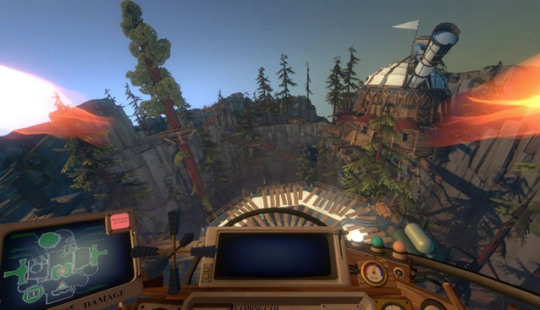
If you need to play one timeloop game, it's this one. Please play it blind. I swear to god you won't regret it. it's timeloops in space!!! it makes you think!!! there are so many "HOLY SHIT WAIT I GET IT NOW" moments!!! please just go play it please please please. some of the best environmental storytelling in a game. so many hints in plain sight. JUST PLAY IT
[way more timeloop games under the cut]
Oxenfree
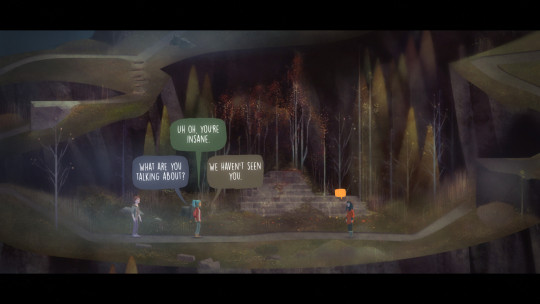
I didn't actually like Oxenfree very much. But also it stayed in my mind for weeks after I finished playing it. that's how you know it's a good game. I really enjoyed the dialogue system in this, and how much the loop affected the characters. and it got so spooky!!!
Hikeback

i'm in the credits for this one because i was one of the inspirations heehee <3 i loved playing it… short little game about trust, self-sabotage, and never-ending cycles. highly recommend it
The Stanley Parable
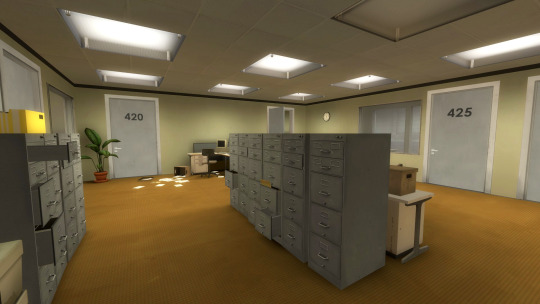
Listen babes it absolutely counts. I replayed it a bunch while making ISAT, and I got immensely inspired by the dialogue, and how it catches you off guard sometimes? You get SO SO used to the narrator's "All of his coworkers were gone. What could it mean?" at the start of every game, and then for no reason instead it says "A soft wind blew outside and perhaps rain started, and if it did it stopped shortly after. Stanley hoped that he would one day see weather." like WHAT THE FUUUUCK IM GETTING CHILLS JUST THINKING ABOUT IT
12 minutes
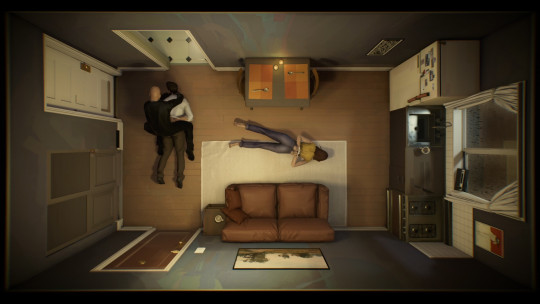
ok i know we all made fun of this game when it came out because the story is batshit insane HOWEVER!!!!!!!! i REALLY REALLY LOVED how doing the same actions multiple times would have slightly different outcomes. If you battle someone, the first time you get knocked out in one hit and the loop restarts. the second time you try, you evade the first hit, but get knocked out. the third time, you last a little bit longer, and a little bit longer, until you can pretty much hold your own against your enemy. And it applies to so many things in this. Retrying different things to see how they would change was a delight.
this game is also so bad its almost good, and if you're interested you HAVE to play it with friends so you can yell about how bad it is together.
Zero Escape
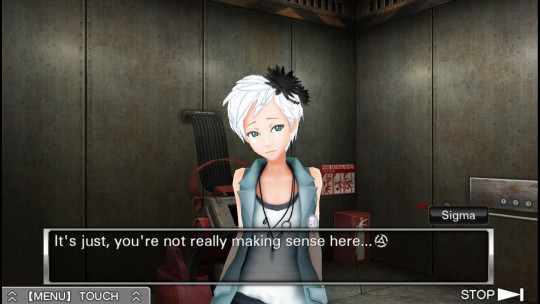
it's just a good series ok. escape rooms, and also time loops! the 3rd game in particular goes deep into The Math of how timeloops would work, which i think is interesting. sometimes timeloop games just go "yeah you can timeloop dont worry about it" and others go "OK HERE'S THE HOW AND WHY IT WORKS" and both are interesting!
START AGAIN: a prologue
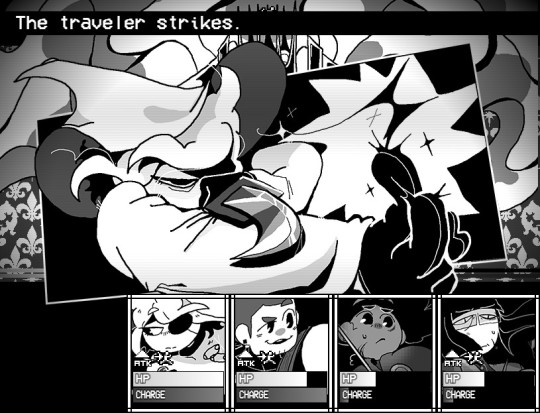
this game has almost everything i could wish for in a timeloop game. depression. lines repeating. dying brings you back. you get new levels and skills because you're aware of the loops but your party members don't. so you get overpowered next to them and they Notice. just. party members who dont know about the loops still noticing something is wrong. you are acting differently than yesterday. you look sad. you are acting weird. you know too much. how did you know where the keys were? how did you know this would happen? what's wrong? talk to us. and oh my god this game has a sequel? which will probably have Actually Everything i could wish for in a timeloop game? i can't wait. who made this? (its me i made this)
Ghost Trick
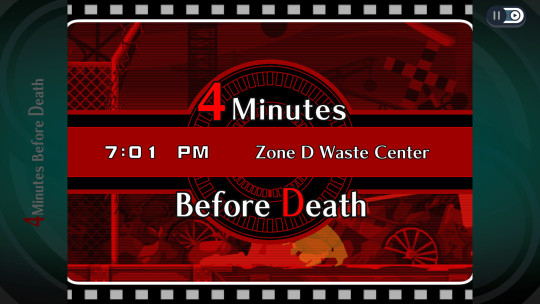
ok its not really time loops and more time travel and only for 4 minutes HOWEVER!!!! you should play it. you know you should play it because everyone says so. so go play it
Elsinore
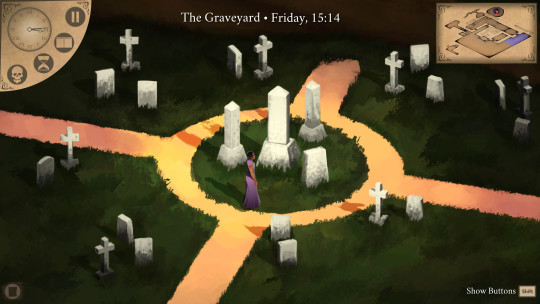
im sure its a great game but ive never seen/read hamlet. so thats a failing on my part. because. you absolutely need to know hamlet to understand this game lol i did like the whole "make sure to find out which events are Important and which ones aren't so you can have The Perfect Loop"! very fun. or it would be. if i. knew. hamlet
The Forgotten City
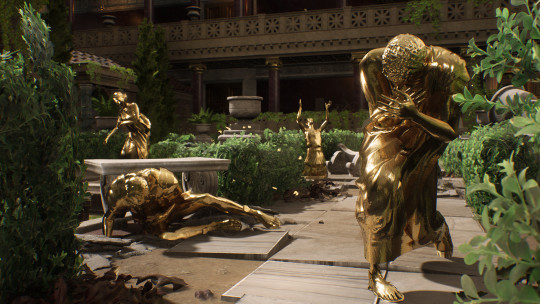
a friend kept recommending it to me and i didn't like it. its good! just not for me. but if you like to think a lot you should play it. another "make sure to find out which events are Important and which ones aren't so you can have The Perfect Loop" game
Gnosia
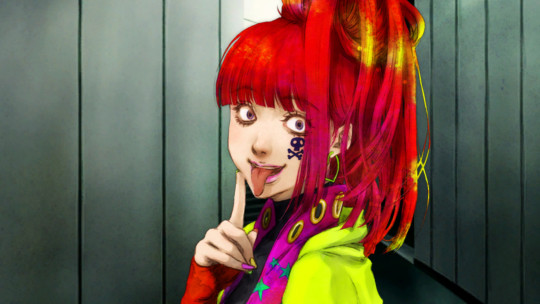
Gonna be real. I didn't like the story very much, in part because the game lets you choose your gender but still acts like youre a straight dude. HOWEVER the gameplay was very inspiring to me. Every loop is pretty much just an among us meeting, and you have to find out who the imposters are or everyone dies and you loop again. and sometimes you ARE the imposter, so you need to make sure no one finds out. or you loop again. rules get added as time goes on too. i REALLY loved how quickly the loops stacked up. seeing "loop 100" was such a nice moment. ive been here so long! i tried to recreate that somewhat for my own game…
Loop Hero

Technically not a timeloop game, but a loop game. It still absolutely counts because it's about loops and memories, and what are loops and memories together if not a timeloop. You have your little guy going through a closed loop, battling enemies, getting cards, and making the world whole again by using those cards to make forests, towns, lakes come to life. I am famously a Story First Gameplay Second kinda player, but I did play this 45h for the gameplay alone. I learned a lot about battle balancing and randomness by playing this!
You and Me and Her: A Love Story

you know doki doki litterature club? this came before. and one might say. it's. better. in some parts (and i say that as someone who LOVED ddlc!) i won't say much except it's a dating sim but with timeloops. with a lot of what it implies. why are you dating this girl a second time? a third time? a fourth time? choose another one already! it was such a fascinating game to play, and is incredibly meta in the way it talks about dating sims and visual novels. had a lot of very impactful moments however, i played the hentai version. some of the worst, most cringy sex ive ever read and heard. however, one might say the sex is an integral part of the game and its deconstruction of hentai/dating sims…? no. just play the steam version which doesnt have the horrible sex scenes and you will have a great time i think (or play the hentai version. if you like. to watch. horrible sex scenes???)
Higurashi
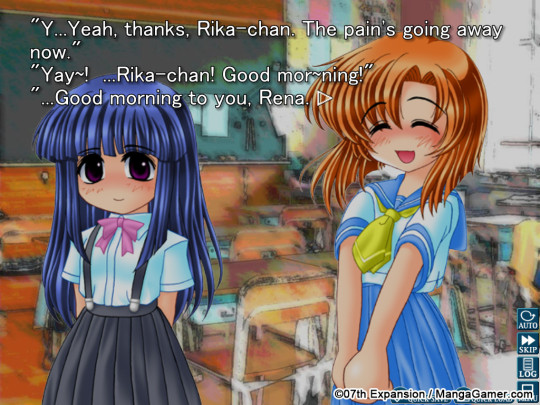
knowing this is a timeloop game is a massive spoiler. however, this game is more than a decade old, so,,, honestly if you havent played higurashi what are you doing. i know i just spoiled you on it but i was also spoiled on it and i can GUARANTEE YOU that you will still have an amazing time. one more thing. you gotta play with the original sprites or you're a fake fan
I Was a Teenage Exocolonist

starts as a visual novel/management sim/dating sim kinda thing, until you realize that every replay is a new timeline. so the main character can save people, because they remembered about them dying in a previous one. i wish the timeloop would affect the game/story more (let me find a certain character quicker once ive found them in a previous playthrough!!!), but timeloop aside, it's a very fun game to play!!!
that's it! hope you will find a nice timeloop game you like
2K notes
·
View notes
Text
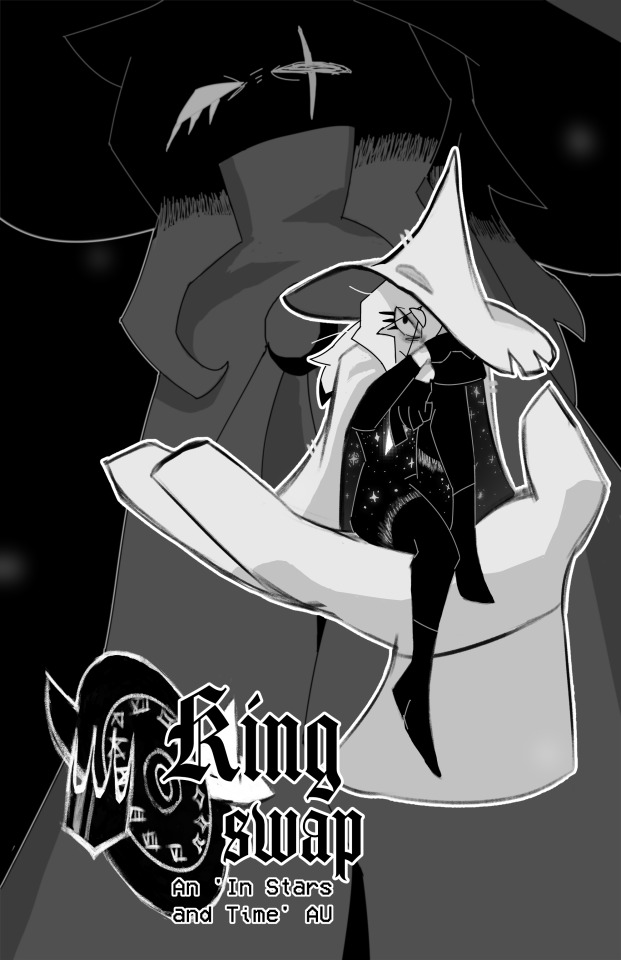
The Stagemaster
(What's Kingswap?) Meet the Stagemaster, the main antagonist of this little Kingswap AU i've been cooking. The fellow who could have been Siffrin, had their life not taken a different path. In this post, I'll cover a bit about where he came from, their personality, what they're capable of, and other bits and pieces.
Well...maybe not everything. A fellow has to keep some mystery to himself.
As a blanket statement, this AU is just full on spoilers for 'In Stars and Time', and any content warnings that apply to the game apply to this post under the cut!
So...where'd the Stagemaster come from? How'd our Beloved Siffrin end up like this?
Truth be told, no one is born a villain, and the Stagemaster is no different. As I spoke a bit about it in the previous post, the Stagemaster starts in a different place than canon Siffrin; already a young adult, staying in Corbeaux before the Island is disappeared. Think of him as the equivalent of a university student away from home.
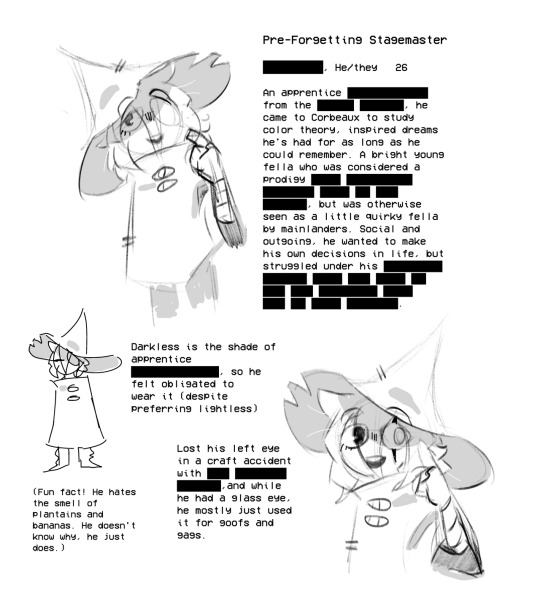
Awwww, look at them! So full of whimsy and so many thoughts in that little head of his! I'm sure nothing bad will ever happen to him ever.
He has a life, he has goals and desires, he has friends in Corbeaux (who aren't The Party we know), and he also has strange dreams but that's not a big deal.
Unfortunately, we know how this ends - The Fella Who Could Have Been Siffrin wakes up one day without a name, without any memories of where he came from, and a whole city and House of people who don't know him anymore. Sure, he has some memories, like why he was studying in Corbeaux, that he had people who he loved, but everything else is just swiss cheese in his head.
He doesn't take it very well.
At some point after the Big Forgetting, after trying to reclaim ANYTHING that's his (and failing miserably)...Not-Siffrin makes a request. A small, selfish wish...for just a little bit of control in their life.
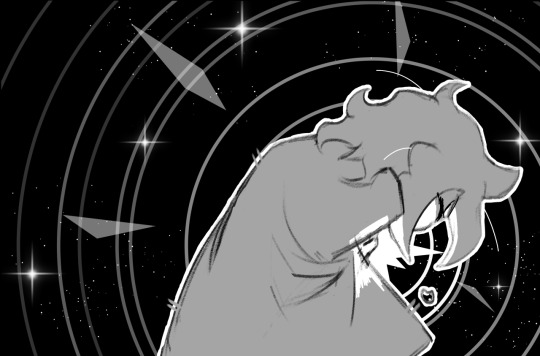
You've heard of eating stars, but I present the thrilling sequel(?): Hugging a star so hard you shove it into your ribcage.
And so is born a stranger with nothing to lose and a general spite of having his life messed with...and a desire to mess with other peoples lives in some form of messed up retaliation. Crashing out and making it everyone's problem.
So, What is the Stagemaster Capable of? Is his gimmick still freezing time, or does he have a new skillset?
Both! But the focus for the Smaster is a new thing called 'Control Craft', inspired partially by ISAT Siffrin's view that he was controlling or puppeting his friends/family like actors...so, the Stagemaster takes that concept and makes it very literal!
He also has the floating Disembodied Hands because I Think That's Cool.


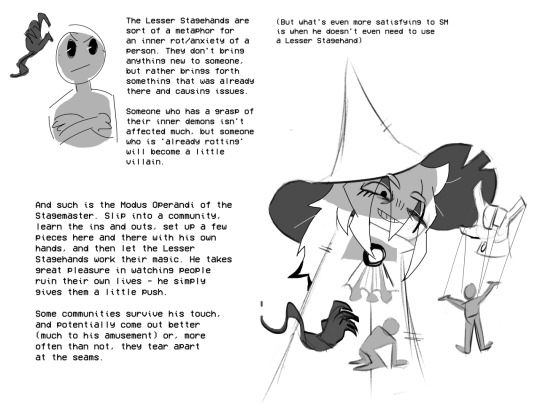
Well before the start of the Loops, and even earlier before the King starts his Time Freezy thing in the main timeline, the Smaster is living his best life, playing with their toys (the toys are other people.) He's sort of a travelling ghost, wandering at his whims to hone his skills, so he's messed with all sorts of places across several countries before even starting his grand torment of Vaugarde.

Vaugarde has it too good, in the Smasters opinion, so, he wants to just subject its people to being Crabs-In-A-Bucket and fighting among themselves before he freezes them. He's pretty petty like that.
The rarity of his Tears makes it a bit hard to do the freezing thing...so it's very convenient he is able to outsource them to this Suspiciously Present Sadness That Technically Shouldn't Exist In This AU!

What Kind of Person IS the Stagemaster, Anyways? What's Their Personality?
I'm going to be so real with you, reader, I just threw a bunch of villains whos vibes I really liked into a blender
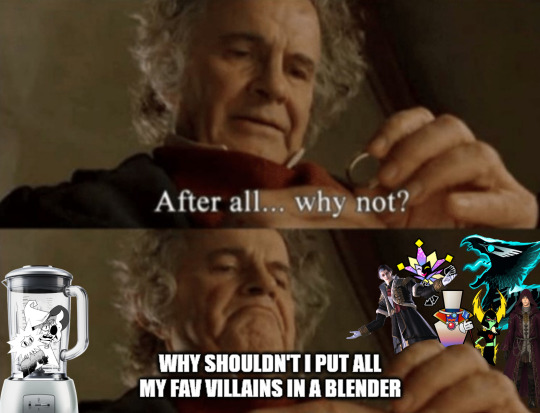
( Emet-Selch (Final Fantasy 14), Dimentio (Super Paper Mario), Count Bleck (Super Paper Mario), Cheline (Phantomarine (Please read Phantomarine)), Lord Dominator (Wander over Yonder) Fandaniel (Final Fantasy 14))
But in all seriousness, I went with a more low down approach to the Stagemaster - the ISAT fandom generally likes focusing on the more Unhinged, Manic version of Siffrin we see from Act 5, and it's a good approach! I love unhinged manic Siffrin, but, I really wanted to explore the more quiet and avoidant aspects of both Siffrin and Loop (while still being theatrical and fun to watch), while also adding some new bits into them.


(If you know where I stole these quotes from, you get a cookie)
I will be so real with you, the Stagemaster is just fun to draw in general, especially peeled (Without the hat or the cloak)
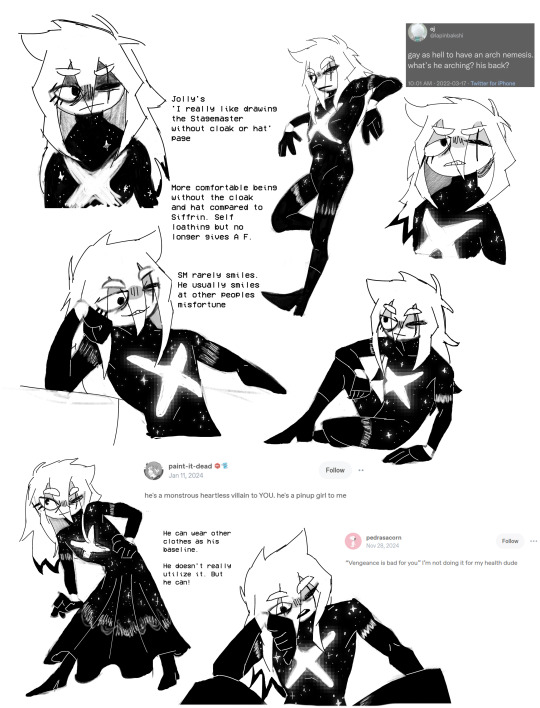

Also...strangely...He knows a lot about the party. Weird!
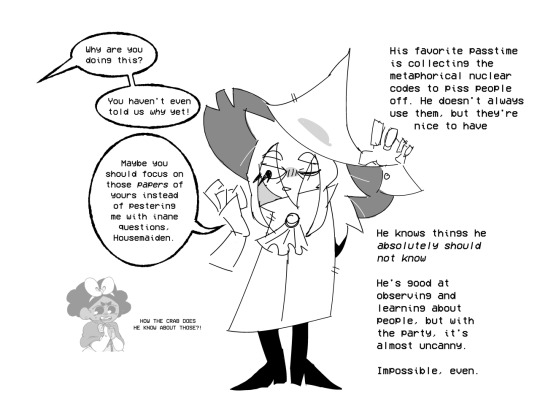
I'm sure it means nothing.
Hey, I've read the Intro post to the AU, and there's this talk of the Stagemaster having a Big Form and a Little Form That Exists At the Same Time - whats with that? Are they Clones?
Not clones! But the same person with two bodies.

But...why does he need this?
You see...the Stagemaster did his whole Thing in Vaugarde, with ruining communities and friendships and stuff...and then went 'yeah, lets move on, time to do Dormont'. Unfortunately, for him Euphrasie, the Head Housmaiden, kind of planned in case he set his sights on the House of Dormont, and forced him to 'go loud' as it were.
Hey, do you also remember why there's so many locked doors in The House of Dormont in baseline ISAT? And the Party eventually figures out it was the Housemaiden's actively locking stuff up to keep the King in? That also applies to this AU.
Long Story Short: Euphrasie played him like a fiddle, put up enough of a fight to force him to Go Big Mode, and then before she was frozen, she activated the whole Orb Door dealio, trapping the Stagemaster in the House.
Even in an AU where Siffrin isn't the looper, Euphrasie still gets to be his metaphorical jailer. Because I think it's funny.
Sure, the Stagemaster could just sit on his laurels. He technically already won, the Time curse is spreading, Vaugarde will be trapped eventually...but so will he. And he would rather be Free than to Win, so...The Avatar comes into play, allowing the Stagemaster to pick up the pace of his Freezing Vaugarde thing, and to have some fun.
This also lets the Stagemaster have a presence in the Pre-Loop Orb Quest the Party goes on to open the Big Orb Door.
But uhhh...

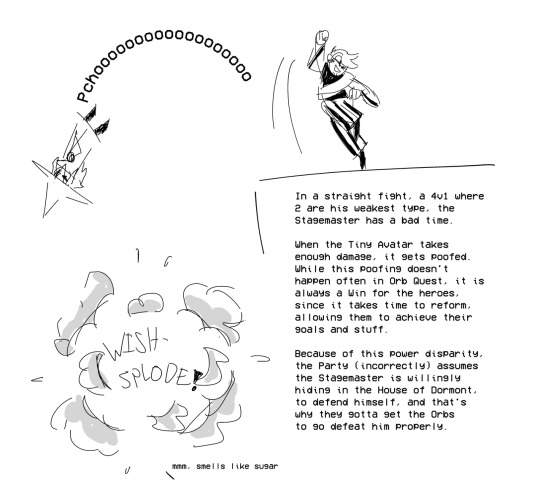

yeah the smaller form is much weaker and the Smaster gets his ass kicked in a straight up fight, forcing him to be sneaky during Orb Quest Antagonism. Usually he cultivates and wrangles powerful Sadnesses for the party to fight.
Eventually, the party suspects that maybe the Stagemaster is weaker than everyone thinks, that he's hiding in the House of Dormont because the Party will easily defeat him, so he's stalling for time to freeze Vaugarde.

Yeah, he's turned the Party into a way for him to free himself. (Funny, then, that they're never getting out of this House anyways, because a certain long haired Knight trapped himself in a silly little Timeloop) (Unfortunately for Clovis, our swapped King...he's not the only one here who is aware of the loops. Good luck, Clovis!)
And that's all for today! Thank you for reading! Hopefully this is the last 'Pre timeloop' info post before I actually get into the Time Loops Proper...But it's so fun to speculate and imagine snippets of the previous adventure!
(As always, a special thanks to the ISAT discords AU channel for listening to my brainrot, and thanks to everyone who's expressed such enthusiasm for these posts!)
#isat#in stars and time#isat kingswap au#isat spoilers#jpdoesart#long post#isat siffrin#I have so much fun just doodling this little guy#he's so nasty#nasty and mean and really a feral cat#having a crisis and taking it out on everyone out of spite tee hee#if this post gets edited its because I saw a typo or something#oops i forgot a whole ass picture imma just sneak that in
289 notes
·
View notes
Text
With the confirmation of The Acolyte not getting a second season, I can't say I'm surprised, the numbers for that show were really bad given what its budgets was, like I kept an eye on The Acolyte's numbers and they were really, really down across the board (Ahsoka's numbers aren't super great either but that's getting its second season because it's Filoni's pet show, I suspect), like set aside all the other complicated stuff, whether it was good or bad, how much of the fandom's reaction was pretty heinous and racist, it just was not getting the numbers it needed and it's making me wonder about how all of these shows are not doing well. Mando is doing all right, OWK did all right, Andor's doing okay, but none of these shows are setting anything on fire anymore (ratings-wise, that is), what would it take to create something that takes off again?
I strongly suspect that The Mandalorian only took off because of Favreau, who really does know how to make something really good and fun in the beginning. Filoni gets a lot of credit for that show, but I'd be willing to put ten dollars on the table that Favreau was driving the vast majority of the success of that series. And that makes me wonder about the future of these shows, because I don't think Filoni is strong enough to really carry a show on his own, most of his best work is when he has a strong partner actively working with him or when he was working under Lucas.
And the creators they bring in to create these shows aren't setting anything on fire, either. Yeah, the sequels made a billion dollars for each movie, but I think it's pretty telling that we're not getting comics or books or games about those characters anymore, the way we did for the prequels characters for more than a decade after they came out. Yeah, Tony Gilroy and Deborah Chow had shows that did solidly well, but they're not anything that Star Wars can build future content off of, they're already backstories for other movies themselves. And I don't think Skeleton Crew is going to light anything on fire, either.
Lucasfilm just doesn't seem to know what to do with Star Wars TV and movies. They had some really good early success with their projects, but almost everything ultimately fizzled out after a few years or ended really badly, and it feels like the only thing that's really hitting with audiences are more Clone Wars-era content and The High Republic novels and maybe still The Mandalorian.
Honestly, if I were Lucasfilm, I'd cut out the live action shows and go back to animation and think long and hard about setting up a new movie series. I think, with the right creative team (and not just who they think is a big name to write/direct), they could have a great trilogy with The Old Republic era stuff, because they have got to expand beyond the PT/OT and the Skywalkers, especially since the sequels put a bad taste in a lot of people's mouths about how Luke, Leia, and Han's stories ended.
(I mean, in my ideal world, we'd get an animated series set in between TPM and AOTC or set like 30 years pre-TPM and getting to see the backstories for characters like Mace and Plo and Shaak and Luminara and Yarael, but I'm not holding my breath on that one.)
818 notes
·
View notes
Text
So... everyone pretty much hated Veilguard's "secret ending", right? Beyond speculation about the Executors themselves, I haven't exactly seen anyone excited about its presence, and for that matter, haven't seen many people talking about it at all.
The closest way I can describe my initial reaction to it was an immediate, visceral disgust. I think I remember uttering at my screen something along the lines of "Fuck off! What the fuck?! Are you fucking kidding me???" and ever since then I've wanted to put into words exactly why it made me feel that way.
For the 88% of you (according to Steam achievement statistics) who didn't see this ending due to not picking up three very specific codex entries by complete chance, you can watch it here. In short, the clip depicts a mysterious voice who sounds suspiciously like Matt Mercer talking about how a group of shadowy figures has "balanced, guided, and whispered" over scenes of villains from the previous DA games, implying that these shadowy figures have been at least partially responsible for all of the bad things happening in Thedas, towards some unknown nefarious purpose.
Now obviously, this sucks. This is hamfisted, unimaginative writing that simultaneously retcons and re-contextualizes elements from DA's past that absolutely no one thought needed further explanation, as well as being exactly the kind of irritating sequel-bait tactics that people have largely grown tired of these days. But why does it suck so much? Why did I feel such palpable distaste for this scene?
For starters, it simply reeks of entitlement, and a lack of respect towards Bioware's own past games. Remember those villains you loved and thought were compelling? Well, their own personal, very complex and thought-out motivations were really just the Executors whispering in their ears the whole time! Loghain making a difficult and calculated decision at great personal cost for a greater good he truly believed in? Executors. Bartrand succumbing to his own greed to the point that he betrays his only family and devolves into a tragic husk of himself? Executors. Corypheus and the Magisters breaching the Golden fucking City??? Executors.
Ignore the infuriating lore ramifications for a second and consider: what do all of these things have in common? They're all instances of complex character motivation; of people in this world doing things for their own reasons that ended up having massive ramifications. In short, they're not events that can be explained easily in terms of black and white morality. And from what we've seen in Veilguard, the current dev team has a serious inability to work with any story elements that do not have absolute moral clarity: the Venatori and the Antaam are Evil. The Shadow Dragons and the Crows are Good. Any nuance; any potential questioning of this duality is quickly explained away or snuffed out.
And that's exactly what they're trying to do, retroactively, with the rest of the series. Having a hard time deciding whether Loghain was right or wrong? Well, worry not, the Executors are Evil and if they were guiding him the whole time, then what he did must have been Evil too! Grappling with how the plot of DA2 was about the inevitable tragedy of a series of oppressive systems reaching their natural breaking point? Well, wrestle no further, for if the Executors were involved then Meredith and Bartrand must've been Evil, no question! What the Magisters did was definitely Not Great, and what do you know, there were consequences for it that they and the whole world very much did pay for. But if the Executors were behind it all, then it was someone else's fault, some Evil power reaching in and making them do what they did, rather than their actions being the result of a horrific series of power abuses done by actual people.
Which leads me to where my initial disgust comes in. Because in a world which has always had core themes of power and its many abuses, actions that have consequences, and the idea that there are no true higher beings; every horrible thing that has ever been done was done by people, the simple act of putting shadowy figures behind key moments in history completely debases and neuters all of those themes. The whole point of Dragon Age as a series up until this point has been to illustrate the complex relationships people and societies have with power, choice, and morality. To remove that link - to place an external force between those characters and their choices - is to rob the series of any meaning whatsoever.
There is a staggering difference between the messaging of a game that tells you ordinary people are to blame for society's wrongs and a game that tells you a secret shadowy faction of evil forces are to blame for them. The former invites thought about one's own society; it has the potential to be uncomfortable and difficult to reconcile with. The latter assures its audience of the fantasy it is couched in. It gives the audience a boogeyman to be angry at, and in so doing deflects any potential for introspection. And that, I think, is the real point of the scene in question.
In a time where our media has become inundated with bland, unchallenging liberal politics, the idea of "cozy" stories have become a growing trend. These types of stories often sport a broad rejection of complicated themes, painful emotions, and nuance, preferring instead to provide a "safe" place to escape to. And with that "safe" space comes a directive not to engage in critical thinking about a work, and not to draw any message from that work and apply it to the real world. Yet this is exactly where Bioware seems to be heading nowadays.
Veilguard has already been faced with heavy criticism about playing things overly safe; removing anything that might be potentially uncomfortable for the player. And the end credits scene is no different. Don't think about things too hard, it whispers to you seductively, in Matt Mercer's soothingly Evil voice. See? The Bad Guys were behind everything, all along.
#dragon age#dragon age the veilguard#veilguard critical#long post#essay#datv spoilers#veilguard spoilers#datv#bioware#bioware critical
407 notes
·
View notes
Text
Let’s Grow the RPG Hobby
Inspired by this post and the conversation surrounding it.
So the RPG world is facing a multitude of interconnected problems. Let’s talk about them, shall we?
---
1: The Problem(s)
Writing this, I find it hard to pinpoint a way to frame the subject of this post as a single thing. But it’s also impossible to treat it as it it’s a collection of separate problems. In reality, the issues facing the indie RPG world are A Hydra; a many-headed conglomeration of related issues, which each require organized, dedicated work to solve. A few examples:
The Normie-Indie Divide
A problem close to my heart, The Normie-Indie Divide describes the gradient between the mainstream of an artistic hobby and the really independent stuff. I compare this to movies a lot, but the more apt analogy is video games. The N-I-D in the videogame industry is so small as to be virtually nonexistent.
We can see this via a number of factors – one example being that the same outlets which cover massive blockbusters & sequels like Assassin’s Creed and God of War, also cover popular indie titles like Celeste and Hollow Knight. Then, freelance journalists who write for those publications (Jacob Geller is an example) go on to cover much smaller games on their own time, and so on. There’s a smooth gradient between the media coverage of the huge stuff, all the way down to a thriving (if still underserved) super-independant industry.
The N-I-D in RPGs feels uncrossable. The most well known RPG is so big it’s currenly riding the high of its second major hollywood adaptation in 20 years, and the second most popular – Vampire the Masquerade – is an unknown even to some indie RPG fans.* This hobby is shockingly impenetrable, even to those of us who spend our days swimming in the deepest end of the pool.
The Supply & Demand Problem
This one’s simple: People are pumping out RPGs by the truckload, and there are just too many! Not only does this make it hard to sift through everything to find the thing you want to read, play, or review, it also makes it nearly impossible to get anyone’s eyeballs on the cool thing you just released!
As others have pointed out, this problem is exacerbated by the fact that relative to some other art media, it’s pretty quick and painless to whip up your own zine or one-pager and publish it on itch. This disincentivises even the most invested of us from looking at a ton of new games, and means that sharing your work can feel like you’re being ignored by a huge crowd.
A Road To Solutions
If all of that is making you feel pretty bad for the future of this medium, you’re not alone. It can feel pretty hopeless facing all of these problems as an indie designer when all the tools you have at your disposal are a tumblr account and a few indie friends to complain to.
But the truth is, I think that this Hydra is eminently slayable. I just don’t think we can do it alone. That in mind, I’ve spent a large portion of my day putting together…
The Call to Action
I think there needs to be organized, persistent effort put into the future of this hobby and this industry, and I think it needs to start the way all good movements do: with a lot of petty, semantic argumentation over definitions and implementation. And to kick things off, here’s my step zero: If you’re reading this post because I’ve tagged you in it (or because I’ve sent you a link to it), my Dms are open. I want to put together a discord group chat† of my peers within RPG tumblr who are invested in tackling The Hydra, such that we can start brainstorming plans of attack to disseminate into the wider community.
The issues I wish to address are these:
The Normie-Indie Divide: How do we go about cultivating a casual audience of indie RPG fans who can bring sustainability and longevity to the industry?
The Supply & Demand Problem: How do we minimize the cognitive load of sorting through the huge volume of work extant in this medium, and more generally encourage peer-to-peer interaction within the community, like news coverage, reviews, and marketing?
The Cognitive Frontload Problem: How do we make it easier to actually engage with a given RPG, considering the amount of cognitive & temporal investment needed? Further, how do we make RPGs, both general and specific, more accessible to readers with a wide variety of abilities, preferences, and available time?
The Insular Community Problem: How do we better connect this hobby with itself, such that it feels a little less like several dozen cliques across 4-6 platforms, and more like the growing, evolving single hobbyist community that it is? Further, how do we make this hobby more accessible to newbies outside the influence of The Hegemons of the Coast?
And more. I’m positive I haven’t thought of everything, and that’s exactly why this needs to be a group effort.
As a last note: Please tag other people! The folks I’ve mentioned here are just those who I personally feel I know well enough to tag; let’s get the rest of the community involved! If you know someone who would be interested who isn’t on tumblr, they can email me: [email protected].
*I’m not kidding. Multiple times within the last four months, I’ve introduced VtM to people who I would consider pretty in the sauce of RPGs. I’m talking folks who’ve played Heart: The City Beneath or Wanderhome. It’s bizarre.
†I need to stress that this is only a start. I’m not looking to start a big public discord unless that’s what a group of folks decide is the right call. By “group chat,” I mean “a chat which exists for long enough to hold 1-3 group voice calls to discuss and hash things out, before it’s dissolved in favor of the execution of whatever plans we devise.”
@theresattrpgforthat; @omophagic-beast; @ladytabletop; @rowansender; @monsterfactoryfanfic; @arsene-inc; @toyourstations
256 notes
·
View notes
Note
what's worse is that the zelda notes end up accidentally contradicting breath of the wild anyway! for example, there's a note that says zelda finds link's blank face "comforting" around disappointed courtiers when in her diaries this is explicitly a reason why she hates him! I also recently found out that the notes imply deya village was flooded before the calamity when in creating a champion it states that it wasn't...the zelda thing is much more egregious to me, I hate what they're doing to her character it feels like they're deliberately making her less smart and more of a simp for link
oh great even more contradiction!!! yippieeee
and for soemthign like that no less, if there were .. understandable little changes from a concept book to a sequel that wasnt planned at that point for the sake of making a better story, i feel that would be a very non issue, but this? in a game as bad and messy as this? is just piling up more and more shit but they cant seem to stop trying to milk it
i also saw the notes about zelda talking about the prison in hyrule castle that "wasnt ever used uwu" and how she thinks theres no need for it now anyway like ------------ waht the helll????? they are trying so hard to make hyrule the purest uwu good and its honestly .... kidna cringe, and i dont use that word lightly
(and while it could be an interesting thought in isolation, i do not believe nintendo is doing that on purpose, like to show jsut badly propagandad everything is about hyrule, with their history and .. well everything going wrong with all this, theres no way i can believe they are consciously and self aware of how this all sounds)
botw zelda was one of my favorite zeldas bc i could see so much interesting potential for her character but all these "new info" bits and totk as a whole jsut make her out to be very very stupid, it doesnt feel like botw zelda, as she was in the game, at ALL, this is like, your uwu perfect little maiden princess in love with the hero and never do no wrong, no mean bone on her body!!1!! look how she could neverrr have a wrong opinion argaaaaaaaaaaaaaarhgshfrgsdhfvbdj she will be the perfect ruler of hyrule with no crime and no wrong doings and if there is its MONSTERS THAT NEED THEIR HEAD STABBED MERCILESSLY for the sake of good only, of course ÖwÖ! there are no other ways to deal with that or ways to think about anything! ÖwÖ
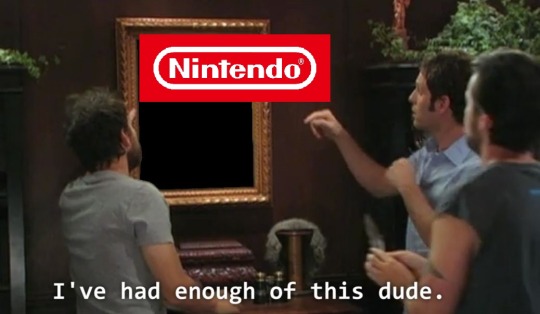
#ganondoodles answers#ganondoodles talks#zelda#totk critical#i cant believe people are just going with this tbh#tin foil hat moment is bc they saw that some weirdos hated botw zelda bc she was slightly MEAN to link ONCE and thought uh oh#we gave her too much of a character and started to backpedal as if trying to win olympia#“oh we can just do and say whatever we want and we still sell out massively! cool!”
115 notes
·
View notes
Text
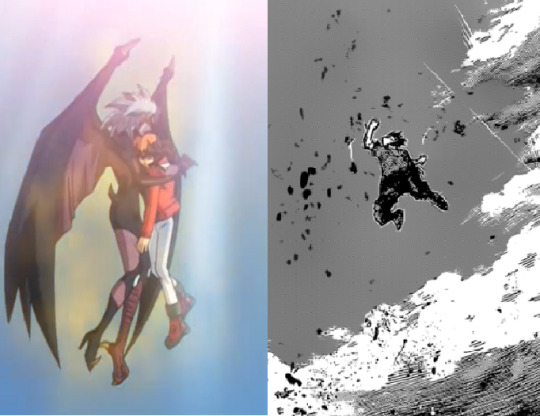
SHIGARAKI VS. YUBEL: HOW TO SAVE YOUR VILLAIN
The failure of Deku to save Shigaraki isn’t just a tragic conclusion for Shigaraki’s arc, it’s also My Hero Academia failing as a story. When I say the story failed, I mean the story has failed to answer any of the questions it asked its audience. It’s themes, character arcs, everything that communicates the meaning of the story to the audience is no longer clear.
Saving Shigaraki was the central goal of not only the story itself, but the main character Deku. By failing in its goal you can’t call this a good ending. In order to illustrate why this goal of saving the villain is so important to both Deku’s character and the central idea of MHA, I’m going to provide a positive example in Yu-Gi-Oh GX were the main character Judai successfully saves their villain. One of these stories fails, and the other succeeds. I will illustrate why under the cut.
BROKEN THEMES = BROKEN STORY
When artists draw they have to consider things like perspective, anatomy, shading, light, coloring. Drawing has rules, and it’s hard to produce good art without knowing these rules beforehand. If I draw something that has bad anatomy, you can criticize me for that.
Writing has rules, just like drawing. The rules of storytelling are important because writing is an act of communication. You can write whatever you want, just like how you can draw whatever you want, but if you break the rules the audience won’t understand what you are trying to communicate.
When I refer to MHA as a broken story, I am referring to the fact that it has broken the rules of storytelling. As this youtuber explains.
“I guess we should first define what broke and broken even means in this context. Has the story turned into an unintelligible mess? Not really. Value judgements aside, the narrative is still functional and fulfills the criteria of being a story. So how can a story that still functions be broken? Maybe to you it cannot. But to me a story that is still functional isn’t enough. What I mean when I say MHA is broken is that it’s lost something crucial. A codifying style of structure, pacing and payoff that until a certain point was the core of its identity.”
I could launch into a long-winded explanation of what themes are, but for the sake of simplicity I like to define themes in terms of “Ask, and answer.” The author asks a question to the audience, and then by the end of the story provides an answer. The audience is also invited to come up with their own answer which prompts them to think about the story on a deeper level. The question both MHA and GX are asking both its main characters and the audience is “Can you save the villain?” with the additional complicated question of “Should you save the villain?” This post will detail how both stories go about answering those two questions, and more importantly why those answers matter for the story.
With Great Power… You know the rest.
My Hero Academia and Yu-Gi-Oh Gx are actually similar stories once you get past their superficial differences. MHA is a story with way better worldbuilding, compared to a society where everything revolves around the trading card game, and people go to school to be better at a trading card game.
However, if you get past that. They are both bildungsroman, stories about the main characters growing up into adults. They both have an academy setting where the goal is for the main character to graduate and enter the adult world. They are both shonen manga. GX is the sequel of Yu-Gi-Oh a manga that ran in Shonen Jump the exact same magazine as MHA. The biggest point of comparison is their main characters, who both start out as young and naive who are driven by their admiration of heroes. Deku is a fan of All Might who wants to become a hero despite not having a quirk, because he loves All might who saves everyone with a smile. Judai’s entire deck archetype revolves around “Elemental Heroes’ and later “Neo-Spacians” who are all based on popular sentai heroes like ultraman.
The central arc for both characters is to grow up. Growing up for both of them not only requires figuring out what kind of adult they want to be, but also what kind of hero they want to be.
Now I’m going to drastically oversimplify what a character arc is.
A character arc first starts out with the character being wrong. Being wrong is essential because if the character is right from the beginning, then there’s no point in telling the story. A character often holds the wrong idea about the world, or has some sort of flaw that hinders their growth. The narrative then needs to challenge them on that flaw. It usually sets up some kind of goal or win condition. That flaw gets in the way of a character “winning” or achieving their goal, so they need to fix that flaw first. If their ideals are wrong, then they need to think about what the right ideals are. If they’re too childish, they need to grow up. If they have unhealthy behaviors or coping mechanisms, they need to unlearn it and require better ones. Otherwise, that flaw will keep sabotaging them until the end.
I’m borrowing the word “win condition” from class1akids here because it’s an incredibly appropriate terminology. Midoriya needs to do “x” in order to win, otherwise this victory doesn’t feel earned. The “x” in this case is usually character development. As I said before, a story where the main character hasn’t changed from beginning to end feels pointless. Especially in Deku’s case, he was already a brave, strong hero who would charge right into battle and defeat the bad guys in chapter one, so him defeating Shigaraki in a fist fight doesn’t represent a change.
The story sets up not only “What does the hero need to do to win?” but also “How does the hero need to change in order to win?” A character either meets these requirements before the end of the story, or they don’t and usually this results in a negative ending.
MHA in its first half quite clearly set up both the final conflict of saving the villains, and also that saving the villains is its “win conditions.” The hero shouldn't be allowed to win without first fixing this flaw.
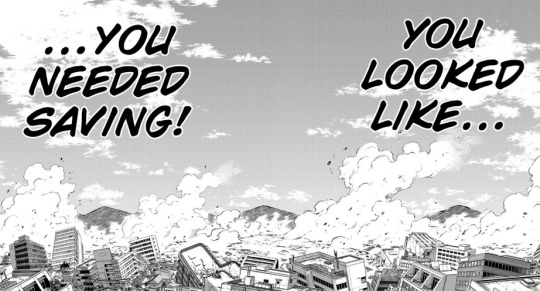
From this panel onward the central question Deku is forced to answer shifts from “Am I strong enough to defeat ShigarakI” to “Can I save Shigaraki?” However, much earlier than that All Might goes on to basically set up the win conditions of what makes the ultimate hero as someone who “Saves by winning, and wins by saving.”
All might: You can become the ultimate heroes. Ones who save by winning, and win by saving.
Therefore the story has set it’s criteria for what kind of hero Deku needs to become. If he wins without saving, then he’s failed to become what the series has set up as the Ultimate Hero.
Shigaraki and Yubel aren’t just narrative obstacles, or boss monsters to be killed like in a video game. They are narrative challenges, which means that the character can’t grow in any way if they don’t answer the challenge presented by the characters. They are villains who actively resist being saved, to provide a challenge for two heroes who define their heroism by saving others. The challenge they pose adds a third question to the story and the main characters.
"Can I save the villain?"
"Should I save the villain?"
"If I don't save the villain, then can I really call myself a hero?"
In other words the decision they make in saving, or not saving their final antagonist defines what kind of hero they are. In Deku’s case it’s even more critical he defines what hero he wants to be because the MHA is also a generational story, and several of the kids are asked to prove how exactly this generation of heroes is going to surpass the last one. The kids growing physically stronger than the last generation isn’t a satisfactory answer, Deku getting strong enough to punch Shigaraki hard is not a satisfactory answer, because we are reading a story and not watching a boxing match.
I’m going to focus on the last two questions though for a moment. Many people who argue against saving villains like Shigaraki argue he is a mass murderer and therefore isn’t worthy of salvation. However, the act of saving Shigaraki isn’t a reflection of Shigaraki himself, but rather the kind of hero Deku wants to be. It all boils down to Spiderman. In the opening issue of Spiderman, teenage Peter Parker is bitten by a radioactive spider and suddenly gains super strength, the ability to stick to walls along with other powers. However, being a teenager he uses these powers selfishly at first. He doesn’t feel the obligation to use his powers for other people, and therefore when he sees a robbery happening right in front of him he lets the robber go. However, because he lets the robber go, the robber then attempts to hijack a car and kills his Uncle Ben in the process. If Spiderman had stopped the robber then he might have prevented that from happening. He had the power to stop the robber, but he didn’t feel responsible or obligated to save other people. As a result Uncle Ben dies. It’s not enough to have power, ti’s how you use that power that reflects who you are, therefore: “with great power comes great responsibility.”
The choice to save Shigaraki actually has little to do with whether or not Shigaraki is redeemable, but rather how Deku chooses to use his power, and what he thinks he is responsible for reflects who Deku is as a person. Deku himself also clearly outlines how he wants to use his power, that One for All is a power for saving, and not killing.
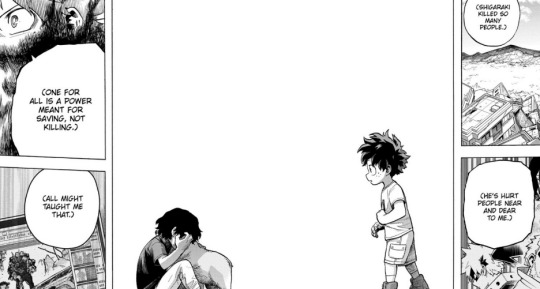
How he uses his power reflects Deku’s ideal in saving others, and therefore if he doesnt use his power to save, then he’s failed to live up to his ideals. It's not whether it's morally right to save a murderer like Shigaraki, but rather the way Deku wants to choose to use his power. It's about whether he feels the responsibility to save others.
Judai explores an incredibly similar arc to Deku. They are basically both asked what kind of responsibilities a hero is supposed to have, which is also a metaphor for growing up to handle the responsibilities of adulthood. As both characters start out with incredibly naive and childish ideas about what a hero is. Therefore realizing what a hero is responsible for is key to them growing as a character. However, Judai is different from Deku. In some ways he’s more like Bakugo. Judai is a prodigy who’s naturally good at dueling. He doesn’t duel to save others, but rather because duels are fun and he’s good at it. He’s very much like Bakugo, who admired All Might as a hero just as much as Deku did, but admired the fact that he was strong and always won rather than he saved others.
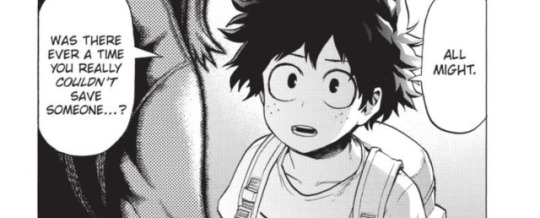
However, I would say both Deku and Judai are questioning what a hero is responsible for. They are both asking if they have the responsibility to use their power to save others. If they have to fight for other people, just because they have power. His first big challenge as a character comes from Edo Phoenix, who calls out Judai for not thinking through what it means to be a hero, and what responsibilities heroes carry. Judai duels because he thinks it’s fun. He will show up to duel to help his friends, but that’s because he’s the most powerful person in the group. Even then it’s because he finds fighting strong opponents to be enjoyable. Bakugo will beat up a villain, but for him it’s more about winning then if the action will save someone or not.
Judai is more often than not pushed into the role of being a hero, he doesn’t play the hero because he’s a particularly selfless person, and he’ll often avoid responsibility if not forced. He has power but no sense of responsibility and the narrative calls them out as a problem.
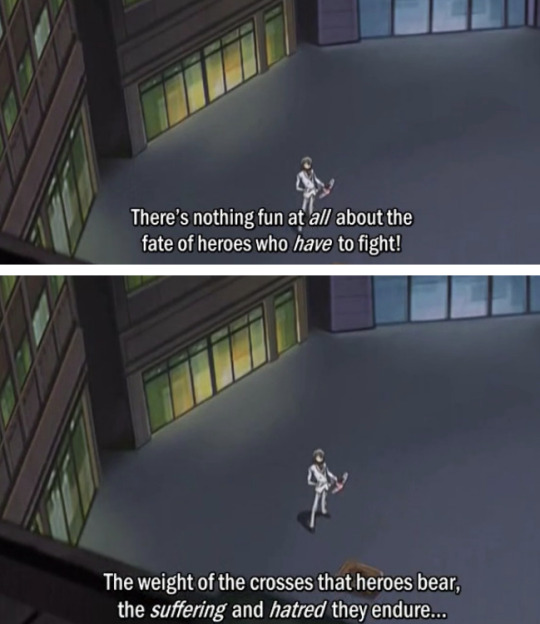
Edo: Can you even fathom that, Judai?
For Judai, he can’t understand the responsibility of being a hero. For Deku, he idealizes heroes so much he can’t understand that there are people out there the heroes have failed to save. These two callouts towards Deku and Judai are discussing similar because they’re both discussing where a hero’s responsibilities lie. Is a hero responsible for saving everyone? Is someone strong like Judai responsible for using their strength to help other people?
Judai’s arc continues into the third season where he’s not shown to just be naive but ignorant. He’s not just childish, he actively resists growing up because he doesn’t want to take on adult responsibilities.
THe same way that Deku just decides not to think about whether or not All Might failed to save people in the panels above. However, in Judai's case he's actively called out for his choice to remain ignorant.
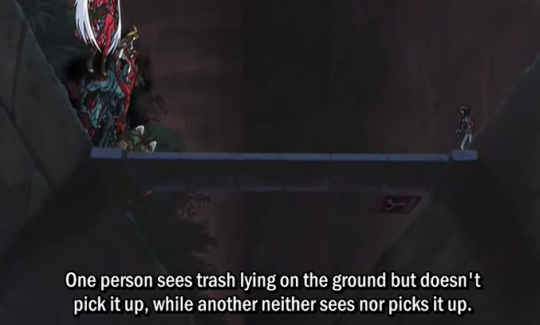
Satou: Now, which one is at fault? Judai: Isn’t it the guy who saw it, but didn’t pick it up. Satou: Not quite. If one is aware of the trash that fell, it may be picked up someday. But there is no possibility fo the unaware one ever picking it up. Judai-kun you are the foolish one unaware of the trash that has fallen. Judai: Are you calling me out for how I am? Satou: Your behavior towards me was atrocious. The worst was attending class only for credit, even if you were there you only slept. Judai: Yeah, I know. I was all bad, but it wasn’t that big a- Satou: It is important. You see, one by one, the students inspired by your attitude were losing their motivation. Now if you were a mediocre duelist, then this would not be an issue. Satou: However, you are the same hero who defeated the three mythic demons. Every single student in the academy admires you. You should have been a model for this academy. Judai: Me, a role model? Are you kidding? I just do whatever I feel like doing. Satou: Great power comes with great responsibility. Yet, as you remain unaware of that, you’ve spread your lethargy and self-indulgence.
seems like a minor issue, but look how Judai responds to the accusations. “I just do whatever I feel like doing.” Satou is arguing that Judai should pay attention to the influence he has on others because of his power, because how he chooses to use that power affects others. However, Judai chooses to actively not look at the consequences of his actions because he doesn’t want to take on that level of responsibility, and therefore he’s looking away from the trash.
While it seems like it doesn’t matter in Satou’s specific example, not thinking of the consequences, or how you use your power can have unexpected consequences. Spiderman doesn’t feel like it’s his responsibility to stop a bank robber, and that bank robber shoots his uncle. You could still argue it’s not Spiderman’s responsibility to stop every crime in the world, and I guess no one owes anyone anything from that point of view - but Spiderman failing to act responsibility had the consequence of directly hurting someone else.
Spiderman has to live with that consequence because it was his own Uncle that was hurt. This is where we really reach the duality of Judai.
In GX, Judai is, symbolically speaking, The Fool of the Tarot Deck, the Novice Alchemist — a person brimming with infinite potential, yet one who is also supremely ignorant, who walks forward with his eyes closed and often unknowingly causes harm in his great ignorance. In this, he is very much the embodiment of the faults we most commonly associate with teenagers — selfishness, recklessness, shallowness, a lack of dedication or empathy when it’s most needed. Like most people, he has good traits that work to balance out some of the above, but his narrative path through GX ends up being that of the flawed hero undone by his faults — and then that of the atoner, the repentant sinner. In his case, the mistakes of his teenage years are the catalyst for his growth from a boy into a man burdened with duty and purpose. Judai is someone with infinite potential, with great power, but also ignorant on how he should use that power, and that makes him an incredibly flawed hero who needs to learn how that power should be used.
Deku similarly exists in a society where heroes deliberately turn a blind eye to the suffering of a certain type of victim. Shigaraki’s speech heavily resmebles Satou’s speech about garbage on the side of the road.
Shigarali: "For generations you pretended not to see those you coudln't protect and swept their pain under the rug. It's tainted everything you've built."
Deku shares Judai’s ignorance, because he’s not only a part of a system that doesn’t even see trash on the side of the road, but he also worships heroes so much that he’s incapable of criticizing them. If Deku saw the flaws of heroes, but at first didn’t have the courage to speak out, but eventually gained the courage that would be one thing. However, if he doesn’t see the flaws of heroes, then the problem will never be fixed.
There are also consequences for both Judai and Deku failing to use their powers responsibly. These consequences take the form of the villains who came about because of all of society’s ignorance to the suffering of victims (Shigaraki) and because of the main character’s ignorance to their suffering (Yubel). Shigaraki and Yubel are also explicitly victims that the heroes failed to save, turned into villains who are active threats to the heroes.
Should I save the villain?
The answer is yes, because the decision to save is reflective of the kind of hero each character wants to be. Each story clearly sets up that Deku and Judai aren’t punisher style heroes who shoot their villains, they are being set up as heroes who save. Deku needs to “save by winning.” As for Judai, a big deal is made of Judai’s admiration for another character Johan who represents a more idealistic kind of hero. Johan unlike Judai is someone who duels with a purpose, something Judai outright says he admires because he’s empty in comparison.
Judai: Johan what have you been dueling for? See, it’s about fun for me… Well, for the surprise and happiness too. I guess I do do it for the fun. Sorry, I guess I put you on the spot by asking out of nowhere. Johan: What’s this about Judai? Judai: It’s nothing. Johan: I suppose there is one goal I have. Johan: Even if someone doesn’t have the power to see spirits, they can still form a bond with a spirit. That’s why I do it for people like him. [...] Johan: I'll fight for everyone who believes in me, and I'll do it with my Duel Monsters. Judai: I'm jealous you've got feelings like those in you.
Becoming a hero who uses their power to help others isn’t just a goal the story sets for Judai, it’s a goal that Judai sets for himself because of his admiration for Johan. Johan represents the idealistic hero Judai wants to be, but is also held back from because of his personality flaws. Johan represents the kind of heroic ideal that Deku is aspiring to be.
Johan’s ultimate goal isn’t punishing the wicked, but to use his power to save others.
Johan: Judai, it was my dream to save everyone through my dueling!
The story sets up the idea that it’s not enough for Judai to simply be strong, he’s also challenged to become a savior who uses his power to help others like Johan. Deku needs to “save by winning” and Judai needs to “Save everyone through his dueling.” However, Johan also adds another condition to what saving means. His idea of saving isn’t to defeat a villain, but rather his dream is to help connect spirits and humans together, even if there are humans who can’t see spirits. Johan doesn’t save people with the power of physical force, but rather the power of human connection.
Should I save the villain?
Here the answer is "Yes", because wants to become more like Johan someone who uses their power to help others not just for themselves. Then we reach the third question
If I don't save the villain, can I really call myself a hero?
It once again comes to power and responsibility. Heroes have great power, and they are responsible in how they use that power, if they use it irresponsibly then there are consequences. Shigaraki wants to destroy hero society, because the heroes irresponsibly use their power to turn a blind eye to everyone’s suffering.
People suffer when heroes fail to live up to their responsibilities. The entire conflict of season 3 is created by Judai failing to save Yubel. If Judai had helped Yubel when they most needed it, instead of abandoning them, then Yubel would never have been twisted by the light of destruction, would never have attempted to teleport the school to another dimension, would never have attacked all of JUdai’s friends.
These consequences matter. Deku can turn his eyes away from Shigaraki’s suffering, but let’s say a hero failed to stop a robbery, or rather he didn’t even try, and because of that his mom was shot and died in the street. Would Deku consider the man who failed to stop a bank robbery a hero? When Spiderman let a bank robber go instead of trying to stop him, was he being a hero in that moment? Both the stories and the characters themselves have defined heroes as people who use their powers to save others, therefore if Judai and Yubel fail to save their villains then they can’t be called heroes by the story’s own definition. Now let’s finally return to the question of "Can I save the villain?"
Was there ever someone you couldn’t save?
m going to start with Yu-Gi-Oh Gx as a positive example of how to save your villain. Gx works for two reasons. One, it’s established from the start that Yubel isn’t beyond salvation, and two, it makes it so Judai can’t win without saving Yubel. The conflict of the story does not end until Judai makes the decision to save Yubel. In some ways the writing is even stronger because Judai is directly responsible for the pain and suffering that Yubel went through that turned them into a villain in the first place. Yubel isn’t just a victim, they’re specifically Judai’s victim.
Yubel is a duel spirit who is also essentially Judai’s childhood friend. A duel spirit just like the kind that Johan wants to save. During their childhood Yubel got too overprotective of Judai, and started to curse his friends for making him cry or upsetting him in any way. Until everyone Judai’s age started avoiding him and Judai became all alone with only Yubel for company. Judai’s decision was to abandon Yubel at that time. He took the yubel card and shot them into space, hoping that being bathed in space rays will somehow “fix” what was wrong with them. I know that’s silly but just go with it. Judai abandoning Yubel had the unintended consequence of Yubel being subjected to the light of destruction, a corrupting light that subjected Yubel to years of pain. This pain literally takes the form of Yubel burning alive.
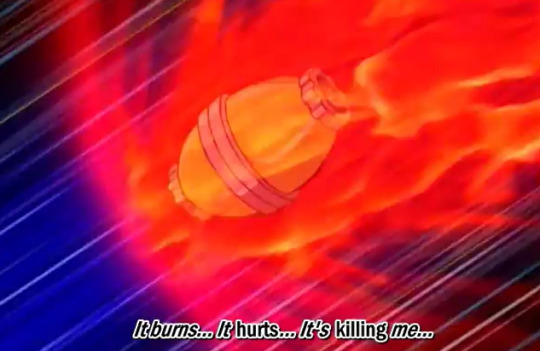
Yubel connected to his dreams called out for Judai every night, only for Judai’s parents to give him surgery that repressed his memories of Yubel causing him to forget them entirely. Yubel then spent the next ten years alone in space, continuously subjected to painful torture, with their cries for help being ignored.
"I was suffering even as you came to forget about me..."
Yubel is then met with the question of how can Judai treat them this way if they loved him so much? As from Yubel’s perspective, they’ve only ever tried to protect Judai, only for Judai to not only throw them away, but subject them to painful torture and ignore their cries for help. Judai effectively moves on with his life, goes to duel academy, makes friends while Yubel is left to suffer in silence all but forgotten. This is where Judai’s ignorance has serious plot consequences.
It’s not just the pain that Yubel endured that made them snap. It’s that their pain went ignored.
Yubel holds out the faint hope that Judai will answer their calls fro help until they finally burn up upon re-entry into earth’s orbit. At which point they’re left as nothing more than a single hand crawling on the ground. Yubel who cannot fathom why Judai would cause them so much pain, and then forget about them, convinces themselves that Judai must be causing them pain, BECAUSE he loves them.
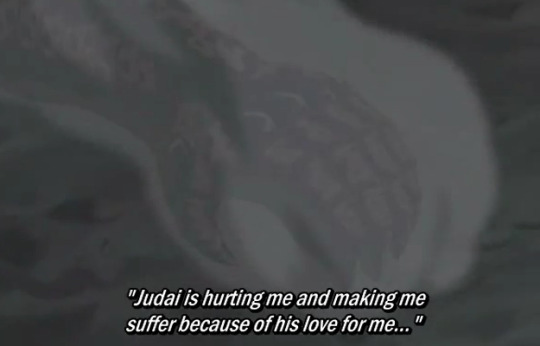
But you see, I couldn't possibly forget about you in the time that I've suffered...
Judai is allowed to move on with his life, to make friends, to spend the next ten years doing so while Yubel is subjected to ten years of agony. When they finally escape their painful torment, they see all the friends Judai has made while they’re left alone and forgotten. However, Yubel’s goal isn’t revenge. Rather, it’s to make Judai share and recognize their pain. WHich is why I said it’s not the fact that they were made to suffer, but their suffering is ignored. Yubel’s entire philosophy revolves around the idea that sharing pain is an expression of love, and that they and Judai share their love for each other by hurting each other.
"That's why I sought to fill all those linked to you, your world, with both sadness and anguish..."
For Yubel, making all of Judai’s friends suffer and Judai themselves suffer is a way of making them and Judai equals again. They want to show “their love” for Judai, but it’s more about forcing Judai to recognize the pain he’s caused them by forcing him through the same pain. Yubel’s philosophy of sharing pain is actually a twisted form of empathy.
They’re not entirely wrong either, that even people who love each other can cause each other pain, and that if one person is suffering alone in a relationship or the suffering is one-sided then there’s something wrong with that relationship.
Yubel: I get it now… You weren’t in love, with Echo. Yubel: No.. you may have loved her just enough to clear the conditions in palace for you to control Exodia, but the you didn’t truly love each other. Yubel: You were only unfairly hurting her, while you stayed unharmed. You wouldn’t suffer. You wouldn’t suffer. You wouldn’t be in pain. Amon: What are you getting at? Yubel: I’ve been hurt! I’ve suffered! I’ve been in pain. That’s why I’m making JUdai feel the same things I did!
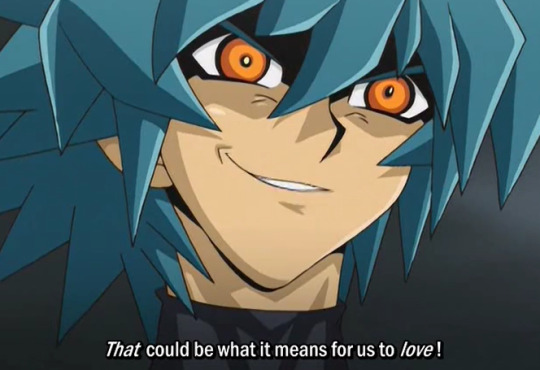
Yubel’s twisted theory of love, is a pretty thinly veiled cry for empathy.
They break out into tears when talking to Amon about the way they’ve hurt and suffered. They clearly state upfront that their goal is for Judai to recognize their love. One of the first things they say to Judai is a plea for Judai to remember them.
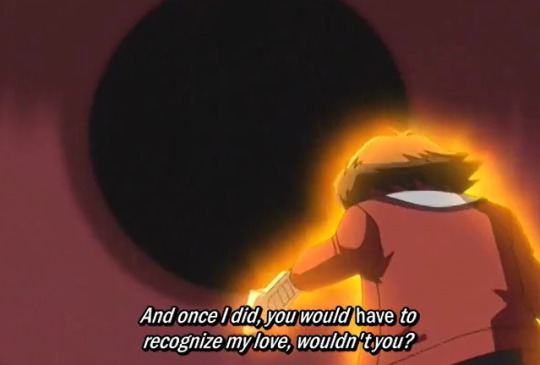
Yubel is presented as a very human character suffering through a lot of pain throughout their entire villai arc, they break down into tears multiple times, they cry out in agony, they're visibly suffering and you see their mental walls begin to break down when Judai denies them any empathy.
Yubel is actually incredibly clear and straightforward about their desire to be saved by Judai. However, Judai doesn’t lift a single finger to help Yubel the entire arc, even though they themselves admit they are directly responsible for Yubel’s suffering but they helped create who they are today.
Judai plunges into a different dimension and gives up everything to save someone, but it’s Johan, not Yubel they try to save. You have Johan, the perfect friend, and perfect victim that Judai gets obsessed over and will not stop at anything to save, and then you have Yubel, the imperfect victim that is actively harming Judai and all of his friends that Judai chooses to ignore. The whole season Judai only focuses on saving the perfect victim Johan, and this is clearly shown to be a flaw. Judai doesn’t just ignore Yubel to save Johan, he also ignores every single one of his friends.
Judai only caring about saving Johan, and deliberately ignoring and abandoning the friends who came with him to help, essentially abandoning them the way he did Yubel leads to another consequence. After he abandons them they get captured, rounded up, and actually die and become human sacrifices.
Losing his friends, causes Judai to snap. Judai becomes the supreme king and decides power is all that matters; he starts killing duel spirits en masse in order to forge the super polymerization card. Which means being left alone, suffering alone, being abandoned by everyone causes Judai to snap the exact same way that Yubel did.
In fact Judai is only saved from his darkest moment, because two of his friends sacrifice their lives, trying to get through to him and appeal to his humanity. At that point Judai’s friends could have just chosen to put him down like a mad dog, to punish him for the amount of people he’s killed, but instead they try to save him because of their friendship.
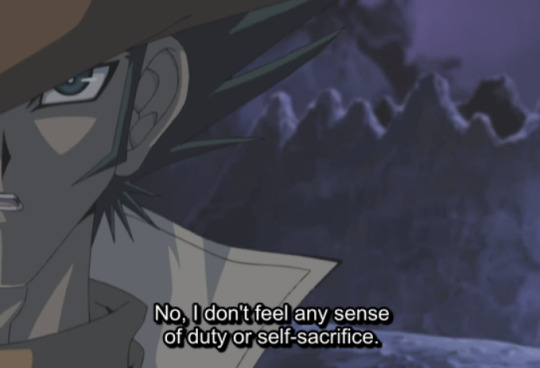
I just want to save my friend. That is all.
By the time Judai is facing Yubel in their final fight, Judai doesn’t have the moral highground against Yubel in any way whatsoever. They’ve both lashed out because of the pain they endured and killed countless people in the process of lashing out. The only real difference between them is that Judai is lucky. He had friends to support him at his lowest point, while Yubel didn’t. Does Judai learn from Jim’s example, and go out of their way to save Yubel the same way they were saved because Yubel is still a friend? Nope, Judai tries to kill Yubel at this point.
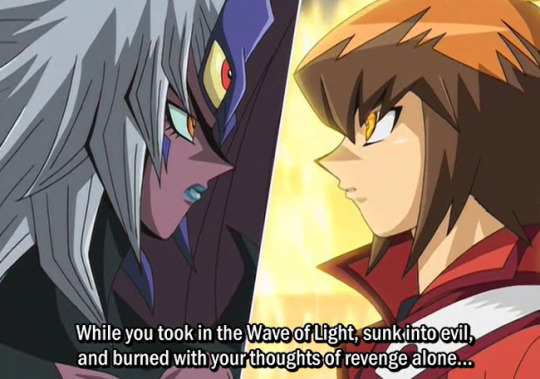
I made a lot of friends... And they all taught me something… real love is wide enough, large enough and deep enough to fill the universe. Your so-called love is only a conceited delusion.
Like, Judai, sweetie baby honey darling. How was Yubel supposed to make friends when they were floating in the empty void of space?
Judai hasn’t learned, they are still ignorant, and still turn a blind eye to Yubel’s suffering. After all if his love is wide enough, large enough,and deep enough to fill the universe then why don’t thy have any room in their heart whatsoever for empathizing with Yubel?
Judai making friends while Yubel was trapped in space doesn’t make Judai a better person than Yubel, it makes Judai lucky. Judai doesn’t even appreciate that luck, because he treats his friends like garbage. It’s not about whether Yubel is worthy of salvation, because Judai is a mass murderer and his friends still went to great lengths to save them anyway. It’s that Judai doesn’t want to empathize with Yubel, because they still want to remain ignorant and irresponsible. Judai wants to continue playing hero, with a very black and white definition of what a hero is. By this point Judai’s killed lots of people, but if he makes Yubel the villain in the situation, he can keep playing hero. He doesn’t have to look at himself and what he’s done, because blaming everything that happened on Yubel and then putting Yubel down like a mad dog allows Judai to absolve his own guilt. Judai practically ignores Yubel’s cries for help, even when Yubel spells it out for them.

I couldn't have lived with the heartache unless I felt that I was being loved...
At this point Yubel themselves acknowledges that their love was just a delusion. That it was a coping mechanism, because they couldn’t live with all the pain otherwise. WIthout it they would have just died, which makes Judai unmoved. The implication here is that Judai thinks yes, Yubel should have just died in that crater. It would have been easier for Yubel to die a perfect victim, then for Yubel to crawl out of that crater and go on to hurt other people. While that may be true the same can be said for Judai - it would have been better if Judai died rather than become the Supreme King. His friends could have put him down like a mad dog, you could have even called that justice - but they didn’t. Judai making no attempt to save Yubel isn’t because he thinks it’s morally wrong to save someone who’s killed as many people as Yubel has, or because he thinks he can’t forgive Yubel, it’s because Judai is taking the easy way out. Johan is a nice, easy victim to save, because he’s Judai’s perfect boyfriend, while Yubel is a complex victim that requires Judai to understand their suffering. Even the act of saving Johan isn’t about Johan himself, it’s about the fact that Judai feels guilt over Johan’s disappearance. What Judai wants isn’t really to save a friend, but to stop feeling guilty over that friend. Judai isn’t just disgusted by Yubel’s actions towards his friend, he also wants to avoid the guilt he feels over causing all of Yubel’s suffering, because it requires acknowledging the complex reality that he is both victim and perpretrator in this case, just as Yubel is both victim and perpetrator.
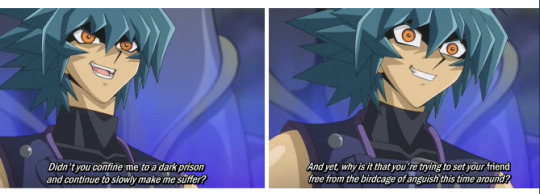
So how can an arc where Judai doesn’t try to save Yubel until the last possible minute, be better than an arc where Deku makes it his goal for the final act of the manga to save the crying boy in Shigaraki?
It’s because the story does not let Judai get away with his continual refusal to empathize with Yubel. Yubel’s entire character revolves around empathy, in the form of sharing pain. As a duel monster, Yubel’s effect is that they are a 0/0 attack monster who is immune to all damage, but when you attack them they deal all the damage back to you. Which means that Yubel will respond to all the pain they feel, by causing you just as much pain in return. Yubel is not a character who can be defeated in a fight, or a duel. In fact they’re the only Yu-Gi-Oh villain who never loses a duel once. The most Judai can do is duel them to a draw, and they draw three times. Yubel wins against everyone else who challenges them. In a way Yubel is like Shigaraki, the ultimate, unkillable enemy that can’t be done away with violence. Judai’s refusal to empathize with Yubel or attempt communication also makes them worse, every time Yubel is hurt they escalate. THe more Judai hurts them, the more they will hurt in return, it’s a cycle that will never be broken simply by killing Yubel, because Yubel is unkillable.
Not only that but the story has gone to great lengths to show that saving Yubel is the correct course of action. If Judai doesn’t save Yubel, he’s basically spitting on the selflessness Jim showed in saving him. In fact if he doesn’t save Yubel, Judai is contradicting his own words on what makes a good friend. Sho once asks Judai after witnessing his brother change, what he should do if a person you lov ehas changed into an entirely different person. What if they're a person you don't even recognize any more? A person you don’t even necessarily like anymore?
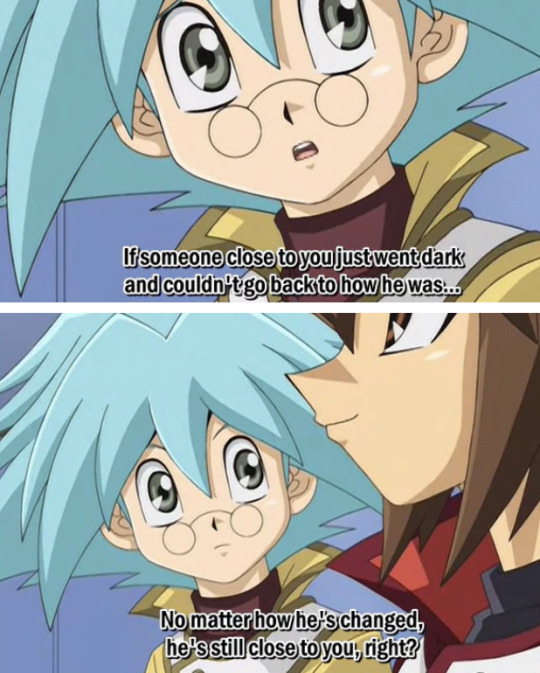
That's why if it were me. I'd probably just be looking after him until the very end, even if I didn't like him. I'd do it cause I think it'd prove that I care about him.
Judai doesn't even say that Sho is obligated to save his brother or morally redeem him, just that he has to keep looking at him instead of turning away or ignoring him.
Judai is being a bad friend, by his own definition. By choosing to deliberately look away from Yubel, Judai’s not living up to his advice for Sho for how you treat people you care about.
Which is why the resolution for Judai and Yubel’s arc is so important, because it’s done by Judai finally acknowledging Yubel’s pain, and promising to watch over them from now on, words that are followed by the action of physically fusing their souls together so they’ll never be alone again. Judai doesn’t just say pretty words about how they won’t ignore the crying child inside of Yubel, but instead he makes a sacrifice to save Yubel at risk to themselves to show their words are backed up by actions. Judai says Yubel will never be alone again, and then he commits.
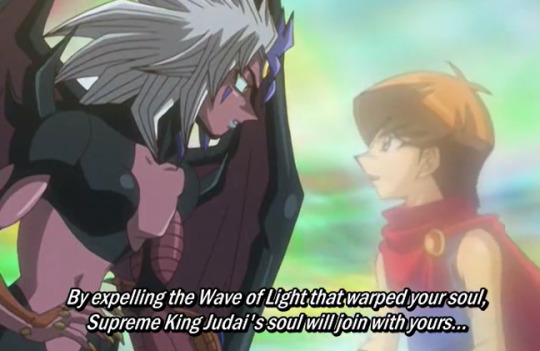
"And even if that means I won't exist anymore... I don't care."
Judai has resolved his character arc by this action, because Judai is finally taking on responsibility and that responsibility is watching over Yubel, so the two of them can atone together. Judai even says himself this isn’t an act of sacrifice on his part, but rather him finally accepting adult responsibilities.
Judai: I wouldn't sacrifice myself for you guys. I'm just going on a journey to grow from a kid into a man.
Judai needed to save Yubel to complete his character arc and grow as a person. If Judai hadn’t saved Yubel, he would have still remained an ignorant child. By learning not to turn a blind eye to Yubel’s pain, and also smacking sacrifices and physically doing something to atone for the way they ignored Yubel up until this point they’ve not only saved Yubel they’ve also done something to address their wrongs. This also continues into the fourth season where Judai’s personal growth results in him learning what kind of hero he wants to be as in Season 4 in order to atone for the spirits that Judai slaughtered, he decides to leave his friends behind and walk the earth with Yubel helping spirits and humans get along with each other. In fact Judai’s final speech as a character isn’t even about how strong he is as a hero, but how weak he is as a person.
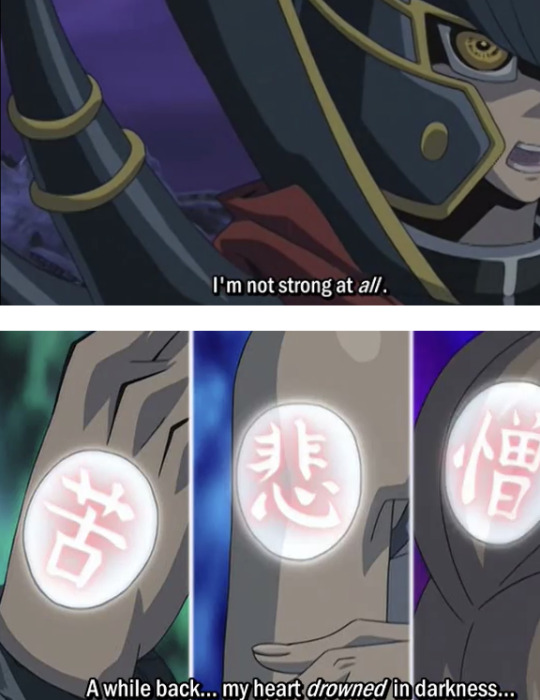
And I put my friends through some rough times. Form that, I figured a few things out... all I can do is believe in them.
The lesson Judai learned is because he’s weak, he needs to empathize and believe in other people the same way that his friends once believed in him when he was at his lowest point. Judai’s not the strongest hero, he’s the weakest one, but that gives him the ability to empathize with people who were lost just like he was, and guide them back from the darkness.
The story of how Deku became the worst hero.
I’m going to say this right now it might turn out next week that Shigaraki is just fine, and he’ll use the overhaul quirk to reconstruct his body. However, even if that happens Deku has completely failed at his goal of saving Shigaraki for the reasons I’ll illustrate below. In theory, Deku’s arc of saving Shigaraki, and therefore winning by saving should be much easier for the story to accomplish and also much less frustrating to watch. After all, Shigaraki has been around since the beginning of the manga, he’s literally the first villain that Deku faces. He’s also the first villain that Deku talks to, where he brings up the idea that there were some people All Might failed to save. There’s also many intentional parallels between the two characters, the entire manga is about their parallel journeys of becoming the next generation hero and the next generation villain. Shigaraki even directly quotes the line at one point that all he wanted was for someone in his house to tell him he could still be a hero, the same line Deku said in the first chapter was that he wanted his mom to tell him to be a hero instead of apoalogizing to him for being quirkless.
Not only is the setup for Shigaraki and Deku made obvious (Deku can redeem Shigaraki by telling him that he can still be a hero too), but Deku himself states out loud that he wants to save the crying child inside of Shigaraki.
Judai runs away from Yubel the whole time, whereas Deku is running towards Shigaraki and actively makes it his goal to understand Shigaraki and continue to see him as a human being rather than a villain. The story also makes it clear that saving Shigaraki is necessary to saving hero society as a whole. After all Yubel is just Judai’s victim. Whereas Shigaraki is the victim of all of society. He’s the crying child who was ignored. The cycle won’t be broken if heroes continue choosing to ignore people like Shigaraki, because more victims will grow up to replace him.
Shigaraki: Everything I've witnessed, this whole system you've built has always rejected me. Now I'm ready to reject it. That's why I destroy. That's why I took this power formyself? Simple enough, yeah? I don't care if you don't understand. That's what makes us heroes and villains.
Shigaraki rejects the world because the world continues to reject him. THe solution to this problem is not rejecting Shigaraki, because Shigaraki won’t go away, the system will just continue to reject people like Shigaraki. As long as heroes and villains don’t understand each other, they’ll keep being forced to fight and the conflict won’t end, because hero society is what engineers it’s own villains.
clear as day by the story itself. If the objective of saving Shigaraki is clear, then how exactly did the story fail in this objective? What went wrong? In this case it’s a failure of framing, and breaking the rules of “show don’t tell.” Stories are all about actions and consequences. When a character makes a certain action in a story, the way other characters around them, the world, and whatever consequences that action frames that action in a certain light. It provides context for how we are supposed to interpret that character in that moment.
For example, when a character does something wrong and another character directly confronts them over what they did wrong, that frames them as in the wrong. The story is criticizing the character for what they did wrong. Context is everything in a story. Stories are just ideas, so they require framing and context to communicate those ideas for the audience. Certain character attributes can be strengths or flaws depending on the context. My go to example is that if you put Othello in Hamlet, the conflict would be resolved in five seconds because Othello’s straightforward personality and determination would have him kill Hamlet’s uncle without questioning things. Whereas, Hamlet constantly questioning and second guessing himself would lead to the worst ending possible. However, if you put Hamlet in Othello, then Hamlet wouldn’t fall prey to Iago’s manipulations, because Othello doubts and questions everything so he wouldn’t believe Iago the way Othello did.
Hamlet’s contemplative and introverted nature can be a strength in one situation, and a flaw in another. Othello’s tendency to act without thinking things through can be a strength in one situation, and a flaw in another. Context matters, because context tells you how you’re supposed to interpret a certain characters actions, and therefore tells you more about that character. This is why people repeat “Show don’t tell” as the golden rule of storytelling, it’s one thing to say something about a character, it’s another to us the characters actions in the story itself to show them something about the character.
What’s even worse then breaking the rules of show don’t tell however, is telling the audience one thing, and then going onto show in the narrative something completely different. In that case the narrative becomes muddled and confusing to read. If I the narrator say “Hamlet is someone who overthinks everything” and then in the story Hamlet walks up to his uncle and kills him with no hesitation, then the narrator is straight up unreliable. It becomes impossible to tell as an author what message I’m trying to get across about these characters, because I’m telling you one thing and showing another.
This is why the writing fails in the second half of My Hero Academia because we are constantly told one thing, but then the story shows something entirely different and sometimes even contradictory to the thing we are being told.
Judai is a much worse hero than Deku, he always runs away from Yubel, and we’re never directly told that he’s supposed to save Yubel either. However, the narrative is incredibly consistent. Judai’s behavior of running away is consistent with his character. All the other character call Judai selfish for abandoning his friends (and they’re not even talking about Yubel). Judai is never painted in any positive light for his actions, therefore we as the audience understand Judai’s behavior is wrong and he needs to fix it. The narrative makes it clear that Judai needs to grow up, and Judai is never rewarded for his refusal to grow up, he’s ruthlessly chewed out, not by his enemies but also by his own friends. However, the narrative isn’t merciless on him either. Season 3 of GX is dark, but it’s not grimdark. Even when Judai loses his way, he’s still shown love and compassion by those same friends who go to great lengths for his sake. The narrative criticize Judai but it never insists that he’s beyond redemption and needs to be put down like a mad dog.
The message is very clear, that not only does Judai need to grow up, but he also deserves the chance to grow and change, which is why he should give Yubel a similar chance. In comparison the story sets out this clear narrative arc for Deku of understanding Shigaraki, but it never challenges him for failing to understand Shigaraki. If you listen to what the narrative says, how other characters describe Deku, and what Deku himself says and only read it on a surface level then yes, Deku’s goal is to save Shigaraki. If you analyze actions however, he is in effect just like Judai he never takes any meaningful action or steps towards Shigaraki, nor does he think of what saving Shigaraki might look like or entail.
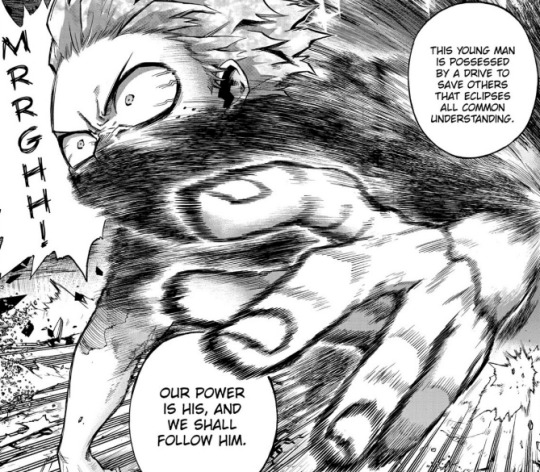
The story describes Deku as someone who is possessed by a drive to save others that eclipses all common understanding, but does the story give us any examples of that behavior?
Judai is characterized as a selfish, irresponsible child, and the story gives us countless examples of his immaturity and how it hurts others. Does the story of MHA do the same for Deku's purported virtues? Let’s run through Deku’s actions, step by step, the actions themselves and how they are framed in order to find any evidence that Deku possesses this drive to save others. Does Deku reflect at all on the question of:
Can Shigaraki be Saved?
Deku leaves on a journey to try to understand villains. When he makes a perfunctory attempt to understand and empathize with Muscle, and Muscle replies that some people are just evil does Deku keep trying to reach his heart? Nope, he just punches him.
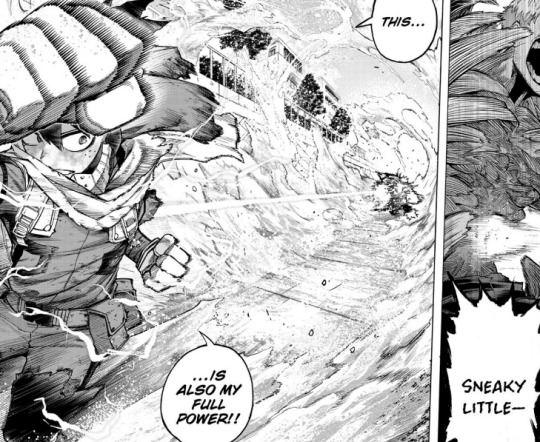
Well, if he’s failed in his goal of understanding a villain then does the story call him out on his failure? Does Deku face any sort of narrative consequence for that failure? Is he framed negatively for failing to understand Muscle, the same way that Judai is framed for abandoning Yubel? Nope. Deku doesn’t express any frustration at all over is inability to reason with Muscle. There’s also no negative consequence for Deku just choosing to punch muscle, it turns out that there was no reasoning with Muscle and some people are just bad eggs so Deku was right. It’s okay for characters to fail, but if a character fails and it’s not framed by the story as a failure then the writing itself as failed. Why even bother to include this scene in the first place if it doesn’t advance Deku’s character in any way? This scene in spite of showing Deku failing to understand someone actively paints Deku in a positive light, because of how much stronger he is ow that he can OHKO a guy that gave him trouble all the way back in the camp arc.
This scene doesn’t tell anything about Deku as a character, it just makes him look cool. In fact that’s precisely the problem, Deku isn’t adequately challenged as a character, because he’s never allowed to fail. Even when he does obviously fail at the things the narrative set out for him to do, he’s never challenged on those failures, because the priority isn’t to make Deku grow, it’s to make Deku look good. As I said before, Judai is the hero because he’s the weakest. Deku is the hero because he’s the strongest. Well, next a big flaw on Deku’s part is that he worshippd the same heroes that were making the world corrupt. Heroes like Endeavor who created people like Dabi. So, does Deku take action to either criticize the older generation of heroes, or separate himself from them in order to try to be better than them? Nope, he teams up with them. Not only that, Deku can’t do something as simple as tell Gran Torino out loud about his plans to save Shigaraki. If Deku feels that Shigaraki is worthy of salvation then he should at least try to make an argument here about his ideal of saving others.
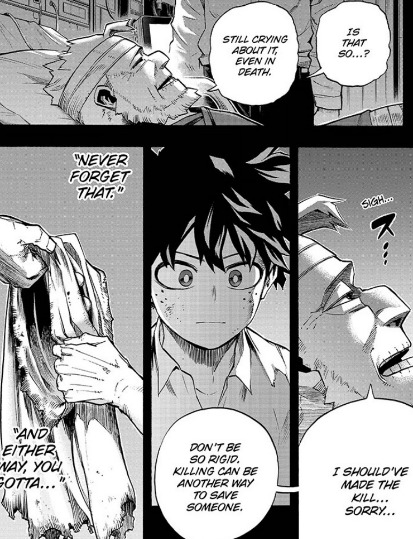
Now here’s the thing, if Deku hadn’t directly looked at the camera and told us he wanted to save Shgiaraki, would we be able to deduce his intentions from his actions? If you took away all of Deku’s internal monologue, and just showed him punching Muscular and saying nothing when Gran Torino says he may have no choice but to kill Shigaraki would anything about Deku’s actions indicate that he wants to save Shigaraki? Let me use avatar the last airbender as a positive example for a moment. People say that Aang’s desire to spare Ozai’s life comes out of left field, but like if you analyze Aang as a character down to their bending, and the way they react in situations they always prefer de-escalation, or taking a third option as opposed to confronting things head on. It’s literally why Toph says Aang has trouble learning earth bending, because as an airbender, he always tries to look for some other way to solve the problem, instead of a direct confrontation with force. As early as season one, Aang tells Zuko someone who has tried to kill him several times that he was friends with someone from the fire nation one hundred years ago and in a different situation they could be friends. Aang’s desire to save the Firelord may not have been told to us until the last possible minute, but Aang’s aversion to violence has always been a part of his character from the beginning. However, Deku never shows any similar aversion to violence. There’s basically no example where he ever tries to de-escalate a situation, or he avoids a conflict by seeking a third option.
Anyway, let’s move onto the next example. In the confrontation where Lady Nagant fights Deku, when Deku learns the fact that the heroes were employing government hitmen to attack people for uhh… exercising free speech does Deku give any reaction to this information? When Lady Nagant says that Deku is only going to bring back the status quo, does he show her any meaningful evidence that he won’t do that.
Deku’s response is because the world is so grey, he needs to extend a helping hand to others. Which you know what thay could be a response. Deku saying that his response to the corruption of the hero world is that he now understands that society led some people down the wrong path, so his way of addressing the wrongs of that society is lending a helping hand to as many people as possible even people he used to think was irredeemable.
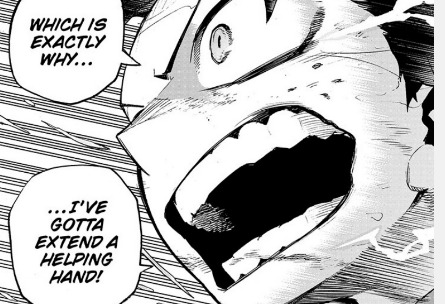
I will give Deku the benefit of the doubt, I think this is an acceptable answer. I can’t save everyone, but that’s not going to stop me from trying to save as many people as possible and maybe I can save people who were this society’s victims on the way too. However, does Deku demonstrate his resolve to extend a helping hand in any meaningful way.
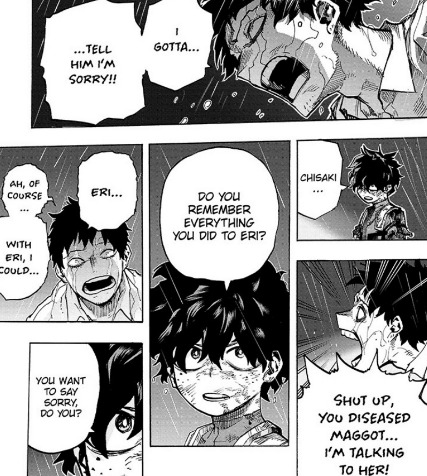
Deku is met with an armless, insane Overhaul who’s begging for someone to help heal his father figure in the Yakuza from his coma. This isn’t like Muscular who insists that there’s no helping him, Deku is met face by face with someone asking him for help. Deku’s gotta extend a helping arm whenever he can, because he knows some people were abandoned and led astray by this society… Unless that person is someone he doesn’t like personally. At which point he only helps them on a conditional basis. We are told Deku will save anyone and everyone, but Deku is met face to face with an armless man who is begging for help and Deku’s does nothing to help him. Deku’s not criticized for refusing to help overhaul either, it’s never brought up again. When Deku begins to experience a mental breakdown because of all the people he’s trying to help in the Dark Deku arc, we are told this is the result of Deku trying to save everyone, but we do not see Deku attempting to save a single villain after Muscular and Nagant.
He exhausts himself beating up villains that AFO sends after him, and only helping innocent civilians. Which would be fine if this arc were about how Deku is running away from his real responsibilities the same way that Judai was running, but that’s not what we’re being told. We are told that this is all part of an arc of Deku learning to understand villains and be a hero.
Deku is asked “Can you save Shigaraki?” by the story, but Deku never at any point has to deliberate on that question. Judai doesn’t deliberate on that question either, but him choosing not to think about things and stay ignorant is the point.
It’s actually fine to make Deku stagnate as a character. It’s fine to have him take the easy way out by just punching villains and giving up on them after one conversation. It’s fine for him to be empathetic to other people’s suffering, or even self-righteous. It’s fine for him to be ignorant.
He could be all of those things if it was a part of a narrative teaching him to unlearn his behavior. In fact the narrative might have been better if Deku started out by saying he didn’t want to save Shigaraki, that there was no choice but to kill him, because then at least his actions would be consistent with his words. Then his lack of empathy and his tendency to resort to violently beating up villains instead of avoiding violence would be character flaws he could work on. Deku however, is presented to us as this empathic hero who is always willing to give others a second chance though he never actually sticks his neck out in order to do so. Continuing on with our slow crawl through MHA, one of Deku’s friends is revealed as the traitor. Deku has a heartwarming scene fo saying that Aoyama can still be a hero, but look at his actions. He lets the adults in the room physically tie Aoyama in a straightjacket and imprison him, for the crime of… doing bad things while he was in a hostage situation. Apparently, if a bank teller helps the bank robber by giving them money when the robber has a gun to his head, the swat team should just snipe the bank teller. Not only does he not defend Aoyama against the adults, or stand up for him, or tell the adults they’re wrong to treat Aoyama a clear cut victim who had a gun to his head and was bing held hostage like he’s a villain - he also lets the adults use Aoyama an innocent victim as bait in order to lure out AFO. Deku tells Aoyama he can still be a hero, but he doesn’t defend Aoyama as a victim of being taken hostage, nor does he stop the adults from further taking advantage of him and throwing him right into danger. Some people are just led the wrong way that’s why they need to be extended a helping hand, but fuck Aoyama I guess. He needs to earn the right to be sympathized with by physically putting his life in danger.
Deku can’t even go out of his way to save a friend who he’s known for the better part of a year, when that friend is a complex victim forced to do bad things.
Then Deku and Uraraka have a conversation where they both, kind of ruminate on the idea that maybe the villains are human beings who are worthy of sympathy.
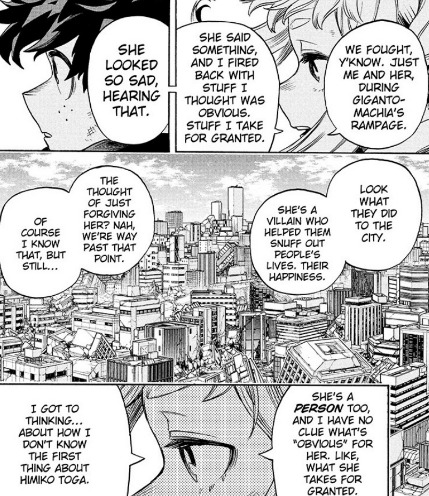
In fact Uraraka is actively trying to dehumanize Toga by looking at the destroyed city, so she won't have to think of Togaas a person.
The language here is also a major fault of this arc. It focuses far too hard on “forgiveness” over and over again. As I said before, saving Shigaraki isn’t about Shigaraki at all, it’s about Deku, and how he wants to use his power as a hero. Deku has even stated himself that he doesn’t believe that OFA is a power that should be used for killing people. So why does whether Toga or Shigaraki are forgivable or not even matter? It’s the same with Deku refusing Overhaul any sympathy. If he’s so morally opposed to abusers, then why does he work with Endeavor and defend him at every visible opportunity, even in front of his victims? Whether or not Deku can forgive Shigaraki doesn’t matter, because Deku is not the moral arbitrator or right and wrong. In fact Deku doesn’t even have any morals, so how is this a moral debate? Is there any point where Deku gives a clear definition of what he thinks right and wrong is? Does he quot Immanuel Kant to the audience?
Batman doesn’t kill people, not because he thinks that every last person on earth can be saved, but because Bruce Wayne an incredibly rich white man thinks that maybe he shouldn’t have the authority to decide who lives and who dies. When Bruce doesn’t kill the joker, it doesn’t mean he thinks the Jokers actions are forgivable, it’s because Bruce thinks it’s not his place to determine whether someone has the right to live.
The whole conflict that MHA presents us is that heroes pick and choose who to save, and only save the ones they deem as innocent. So, how does Deku saying repeatedly they can’t forgive Shigaraki contribute to that theme in any way? In fact by focusing on forgiveness, rather than whether or not he personally has the right to pick and choose who lives and who dies Deku is ignoring the elephant in the room. The question isn’t about whether Shigaraki’s redeemable or if his deeds should ever be forgiven. The question is whether Deku has the right to decide who gets saved and who doesn’t.
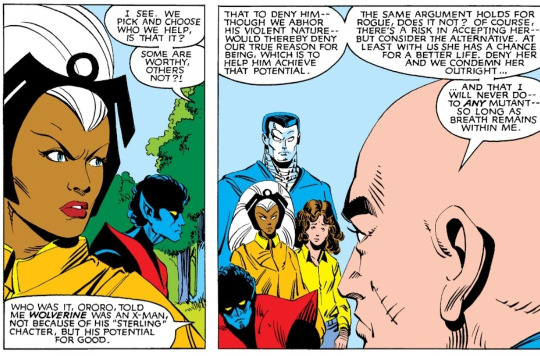
We are told that Deku as a character is someone who wants to save everyone no matter what, so Deku shouldn’t be focusing on whether or not Shigaraki is worthy of forgiveness, he should be making an idealistic argument like Xavier does in this panel. Why doesn’t Deku talk out loud with Uraraka on how he believes his power is for saving others, and not killing? If he’s meant to represent some idealistic hero, then why doesn’t he even talk about his ideals? Why don’t I as the reader know what those ideals are?
I think Xavier’s ideals of forcing the X-men to provide a good example to the mutant community, in order to try to earn the respect of other human beings is wrong, but at least he has ideals. He tries to inspire the other people around him to live up to those ideals. The story can criticize him for his ideals and point out how they’re wrong, while it can also uplift parts of his idelogy like where he believes there are no evil mutants. Deku has a chance to do the same to Uraraka, to tell her clearly, “I don’t think we as heroes have the right to pick and choose who we help…?” but he waffles. Not only does he waffle, but this moment is meant to be read as an indication that both Deku and Uraraka are sympathetic individuals who want to save their villains. They are supposed to look good and idealistic here and they don’t. For Deku it just seems like a repeat of his behavior with Overhaul. The only villains that are worthy of sympathy, are the ones that he personally decides are forgivable.
The story isn’t about whether or not it’s moral to save someone who’s killed as many as Shigaraki has. The story never seriously discusses any sort of complex morality or moral philosophy. Once again to bring up avatar, yes you can argue Aang sparing the life of a war crimminal is bad, but Aang mentions on multiple occasions that he wants to retain the cultural values of the airbending people. Aang has a morality, a consistent morality, it might not be a morality you personally agree with but at least he has one. Deku hates abusers, unless he’s next to Endeavor then he thinks abusers should be given the chance to atone. Deku doesn’t believe that One for All is a power for killing, but he never stands up to any of the adults who are blatantly trying to kill Shigaraki, he doesn’t even express out loud to Uraraka that he doesn’t think heroes have the right to decide who lives and who dies. In fact he’s given the perfect opportunity to, when Hawks kills a villain and it’s broadcast live on the news in font of everyone, but Deku never has anything to say about that. The reason Deku and Uraraka both put such an emphasis on “forgiving” their villains has nothing to do with the story itself. It’s because the author Horikoshi, is afraid that some people will misinterpret his story as saying that he actually thinks that saving a villain like Shigaraki means that he condones mass murder, so he has to have the characters talk about not forgiving Shigaraki.
Judai doesn’t have any consistent morals either, but once again that’s the point and something the story relentlessly calls him out on.
Cobra: Fortune would never smile on a fool like you who fights while prattling on about enjoying duels. Cobra: You are certainly a talented duelist. But you have one fatal flaw. Judai: A fatal flaw? Cobra: Yes, your duels are superficial. Someone who fights with nothing on his shoulders, cannot recover once he loses his enjoyment. What a duelist carries on his shoulders will become the power that supports him when he's up against the wall! Cobra: But you have nothing like that! Those who go through life without anything like that cannot possibly seize victory. Cobra: But I know that nothing I say will resonate with you... because you have nothing to lose but the match. Judai: I... Cobra: Afraid aren't you? Right now, you have nothing to support you.
Judai’s regularly called out for his superficiality. Judai is only a hero because he’s strong and wins fight, he doesn’t feel any responsibility towards other people, and in fact he loathes having to feel responsible for others. Judai isn’t just naive, he deliberately chooses to remain ignorant. Since he’s ignorant of his own faults, he makes awful decisions when it comes time for him to lead, and his friends die because of choices he made. We are told that Deku doesn’t want to remain ignorant, that he wants to understand villains, but Deku’s actual actions are him continuing to ignore society’s ills and the suffering of victims. In fact if you take away Deku’s internal monologue and the narration, Deku’s actions almost exactly mirror Judai’s.
Deku is just as superficial as Judai, and he also doesn't want to spend any time thinking about what kind of hero he wants to be, but the narrative never punishes him for it.
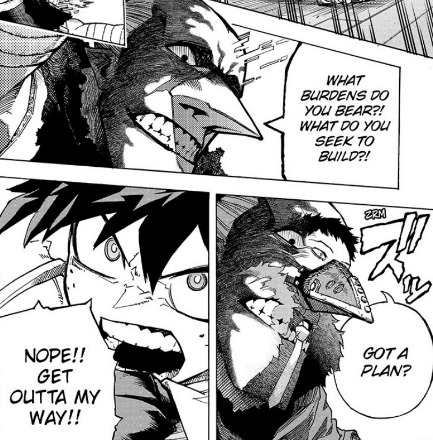
Judai is asked what burdens he has to bear and he has to meaningfull answer that question, Deku is allowed to get away with not having to think about anything. Deku remains superficial. Both Judai and Deku spend the entire arc running away from their villain rather than confronting them in any meaningful way. They both never express out loud any sympathy for their villain, or try to empathize. THey both never step down from the role of hero, and only confront their villain as a hero, because they don’t want to think about themselves as complicit or in the wrong. Shigaraki and Deku’s final confrontation mirrors Judai and Yubel’s but without the same clear framing. THe entire time Yubel is trying to get Judai to empathize with them, and Judai only responds with physical violence, because they don’t want to stop being the hero and because they can’t see Yubel as anything other than the villain. As soon as Deku arrives on the battlefield (by the way everyone else and their mom pointed this out, but Deku who doesn’t think OFA is a power for killing, is completely okay with a plan called the “Sky coffin plan” where every other hero was clearly trying to murder Shigaraki).
When Deku arrives he asks if Shigaraki is still in there, but he doesn’t do anything to try to reach Shigaraki, he jumps right to punching him. In fact he never tries anything besides punching him as hard as possible. How is punching Shigaraki with the force of a thousand suns saving him exactly? How is that different from how he tried to defeat Shigaraki the last war arc, before he saw the image of the crying child that made him want to try a different approach in saving Shigaraki? In Judai’s final fight with Yubel, it’s made explicitly clear that Judai is not trying to save Yubel, and that’s a fault on his part. In fact Judai gives the traditional “I have friends, and you don’t” speech to Yubel but it’s a subversion of how that speech is usually used. Usually that speech is used to show that the protagonist won because of they valued friendship,while the villain treated their friends poorly and only cared about power. However, it’s ironic in this case because Judai got all of his friends killed. Judai treats his friends like garbage. This speech isn’t used to show that Judai is winning because he values his friends more than Yubel does, it shows that Judai is a hypocrite, playing the hero in this situation where they are just as bad as Yubel. Judai’s not morally superior, he’s just lucky that he has good friends. Friends that were willing to save him. The only connection Yubel has to anyone else, Yubel’s only friend is Judai and Judai is a shit friend.
In fact, Mirio tries to give a version of the “You don’t have any friends” speech to Shigarkai, only for Shigaraki to get mad and tell Mirio that he does have friends and people he wants to protect.
This fact is also something that is blatantly ignored by Deku, even though Mirio tells him about it… even though we are told that Deku is trying his best to see the humanity in Shigaraki.
Judai blatantly admits they’re trying to kill Yubel. Which makes them a worse person, but a better character than Deku, because their actions are clearly framed by the narrative and consistent.
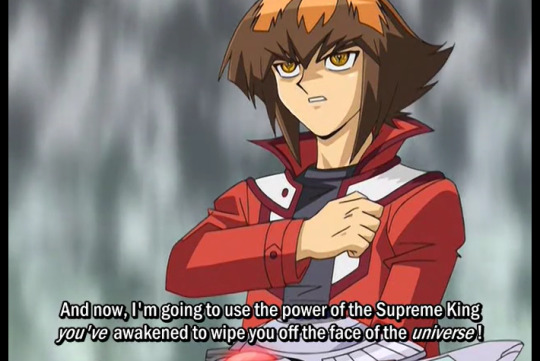
On the other hand we are told that Deku doesn’t want to kill Shigaraki, and yet everything Deku does makes it look like he’s just trying to kill Shigaraki and put him out of its misery. If we didn’t have Deku stating out loud that he wants to save Shigaraki and wants to see him as a human, there’d be nothing in his actions to indicate that he’s trying to avoid killing Shigaraki. Deku says he can’t pretend he didn’t see Shigaraki crying, but like, does he ever hesitate to punch Shigaraki, does he ever think that causing Shigaraki more harm is wrong when he’s already suffered so much? Deku says that Shigaraki is a person but does he treat him like a person? Does he try to talk to him like a person? To use avatar again, Aang does talk to Zuko pretty early on. Deku doesn’t even give the classic “We could have been friends under different circumstances” speech. When Shigaraki resists Deku’s attempts to see him as a person or emapthize with him, Deku’s response is to just resort to punching harder.
Which is in effect the same thing Judai does to Yubel, just kill them as a villain so they don’t hurt anybody else, but framed in an entirely different light. Judai is shown to be ruthless, and cold in his attempt to only settle the conflict with Yubel by violently putting them down. On the other hand we’re being told that Deku is compassionate and empathic while he punches Shigaraki with the force of a thousand suns.
There’s another eerie similarity between both of these final confrontations. At the climax of the confrontation, both Judai and Deku have a psychic vision where they see events from Yubel and Shigaraki’s childhood. This vision is supposed to help both characters understand the good in the villain they’re facing.
Let’s see the contents of this vision and how the visions change each character. Judai is shown a vision of his past life where Yubel sacrifices their entire body, and even their humanity to go through painful surgery to turn into an ugly dragon, all for the sake of protecting Judai in a previous life.
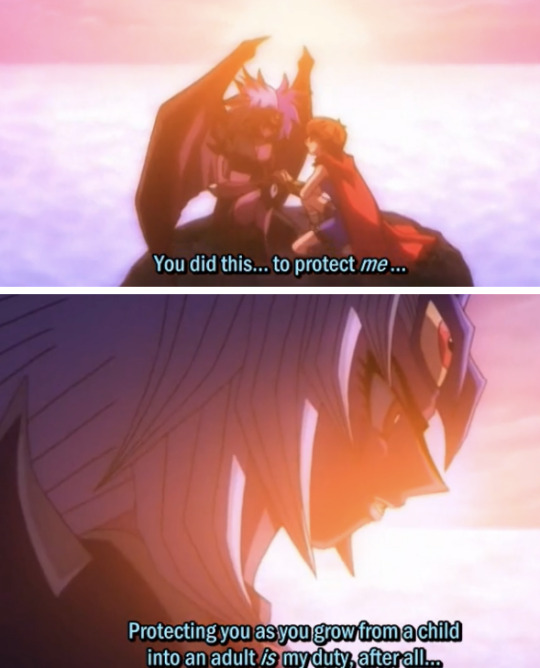
Judai is then forced to witness the good side of Yubel they’ve been ignoring all along to paint them as a villain. Yubel is simultaneously extremely selfish and willing to hurt people Judai cares about, but they’re also extremely selfless and will do anything to protect Judai and have made great sacrifices in the past for Judai’s sake. Deku gives lip service to not ignoring the humanity in Shigaraki, but Judai is literally forced to acknowledge the humanity in Yubel. Not only that, but Judai changes his behavior immediately after learning this new information. After seing the sacrifice that Yubel made for him in the past, Judai responds with a sacrifice of his own. A sacrifice that perfectly mirrors the sacrifice that Yubel once made for him. Yubel gave up their humanity for Judai, so Judai fuses his spirit to Yubel’s, becoming a human / spirit hybrid so Yubel no longer has to be alone.
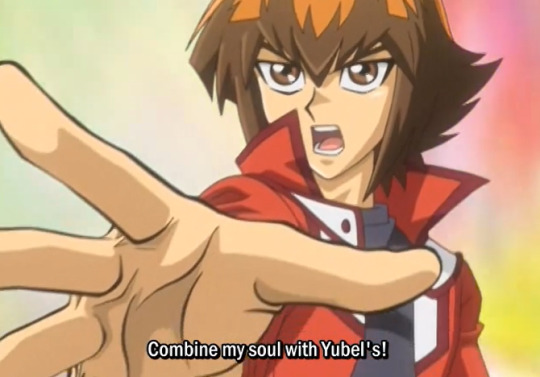
Judai also doesn’t just fuse their soul with Yubel’s in order to stop Yubel from destroying everything, it’s because both of them at this point need to atone together, and Judai is fulfilling his responsibility of watching over his friend until the end to prove that you care about them - as he said to Sho. Judai’s also fulfilling Johan’s dream of helping repair the bonds between spirits and humans, by reconciling with Yubel and repairing their bond. It’s also Judai atoning for his previous behavior of abandoning Yubel, by choosing to stay alongside them as they both atone together. Deku does sacrifice OFA during the fight against Shigaraki, but their sacrifice isn’t to help Shigaraki, but rather doing psychic damage to Shigaraki by using OFA is the only way to defeat them. He transfers OFA in order to break Shigaraki’s brain so he’ll stop reissting and Deku can beat him down. Judai fuses their soul together with Yubel out of empathy and a responsibility they feel to help their friend fater abandoning them, Deku transfers One for All to Shigaraki in order to hurt him and make him easier to punch. It's funny that Deku doesn't travel to Shigaraki's mind to learn more about him, but instead with the specific intent of harming him.
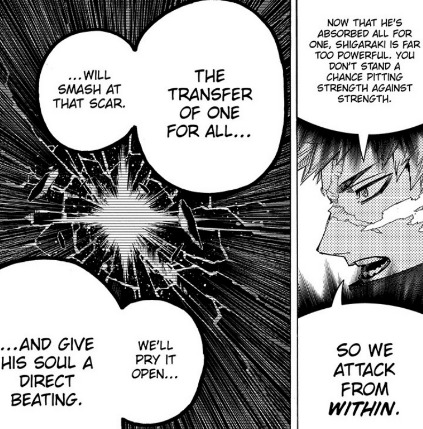
Once he's inside Shigaraki's mind, he doesn't take time to reflect on how Shigaraki used to stand up for bullied kids, or how he wants to be a hero to villains because no one else will stick up for the outcasts in society. No, he only care about Shigaraki when he takes the form of a child crying for help.
In the aftermath of the psychic vision Deku’s behavior doesn’t change towards Shigaraki in any way either. You could say he sacrificed his own arms in order to try to comfort Shigaraki within the depths of his own mind - but that’s not a real sacrifice either because his arms immediately come back. When Judai learns about the sacrifice that Yubel made in a previous life towards him, he stops seeing Yubel as an enemy and finds a way to resolve things peacefully between them. When Deku lanterns that Shigaraki’s a victim of All for One, and that his entire life was a lie, when he sees Shigaraki’s suffering first hand does his beavior twoards Shigaraki change in any way?
When he sees Afo has taken over Shigaraki’s body again, does he try to shout for Shigaraki, to tell Shigaraki to fight from the inside, to reassure Shigaraki that he’s still in there that there’s still good in him? Nope. He just punches Shigaraki some more.
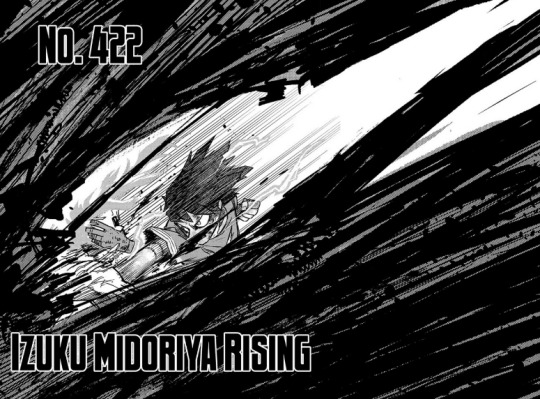
What Deku needed to tell Shigaraki is so obviously set up by the narrative too. Shigaraki wanted just one person in that house to tell him he could be a hero. Deku wanted his mother to tell him he could be a hero if he was quirkless. Deku sees that Shigaraki started out as a boy who wanted to be a hero, and who was manipulated into being a villain but does he try to appeal to the boy inside of Shigaraki by telling him he can still be a hero? Does he now see the good in Shigaraki? Nope, he just tries to kill him by punching him really hard.
I purposefully chose the images for the banner of this post, because it shows how differently MHA and GX treated its villains in the end. Yubel is embraced by Judai in the end, Shigaraki evaporates into dust.
"Judai, now that our souls have become one we will never be separated again. I have now been filled with your love and power. Let us fight together, against the wave of light leading this universe to destruction!"
Shigaraki could so easily have been given the love and empathy that Yubel was shown, but instead their life ends with no show of empathy from Deku, and with them dying believing that their long life of tragedy meant nothing in the end. Shigaraki realizes he's a crying kid, but he's never comforted.
Shigaraki: I only stole my body back from Master, and I didn't destroy anything. "In the end, I was just as you said... A crying kid, huh?"
Yubel is embraced and comforted, Shigaraki disintegrates into nothing.
One of these stories is apparently an optimistic story about heroes saving people, but it ends with the lifelong victim being killed in the most nihilistic manner possible, never receiving comfort, and never achieving anything with his long life.
The other story is a silly anime about card games, shows that when people are alone and suffering they can lash out and do terrible things. That all people are weak especially when they're alone, but the solution isn't to abandon them, or condemn them for their faults, but to believe in them and help uplift them the same way that Judai decides to uplift Yubel so they can atone together.
Which is why Deku gets an F in being a hero. Go directly to summer school. Do not pass Go. Do not collect $100.
#mha meta#ygo meta#mha 423#bnha 423#mha 423 spoilers#bnha 423 spoilers#izuku midoriya#deku#shigaraki tomura#tenko shimura#judai yuki#yubel#soulshipping#yu gi oh gx#yu gi oh
807 notes
·
View notes
Note
did u not like totk?
i LOVED totk. i think it was well-written and did its job as a sequel to botw very well. HOWEVER. i do think it suffered slightly from the commercial success of botw. as i mentioned in my last post, nintendo does this. thing. when one of their games gets popular where every game after it has to be Exactly The Same so they can make all the money in the world via comparison marketing. (and this is a problem with the wider game industry in general but also a very observable pattern in loz specifically.) I know it's been a pretty long time since botw came out, but before (and immediately following) its release there was some pushback from longtime fans who worried that the open-world and lack of traditional dungeons meant that the game had strayed too far from the classic formula that makes a game a "zelda game." this is to say, botw was EXPERIMENTAL. and the devs had no idea if what they were doing was going to be successful or not. the open-world of botw wasn't a gimmick, and it wasn't the devs jumping on the open-world bandwagon. it was what CREATED that bandwagon. the open-world was a deliberate choice made specifically for botw because it reinforced the story that botw was designed to tell. the game is about exploring a desolate world, about making connections, and rebuilding both the broken kingdom and the player character's shattered sense of self by traveling and learning and building relationships. a large open-world map with only minor quest guidelines and lots of collectibles and side quests lends itself perfectly to this specific story, which is specifically about exploration and rebirth.
the problem is, botw was. almost TOO good. it was so good that every other game company on the planet started scrambling to build giant open-world maps into their next release, regardless of how much sense that actually made narratively. and because of that, when it came time to release a sequel to botw, the devs had a lot to think about. they had HUGE shoes to fill in terms of fan reception, but they were ALSO being asked to follow up one of the best-performing games of all time, commercially. totk needed to SELL as well as botw. And, likely because nintendo was worried about that potential commercial value, totk needed to keep people comfortable. I don't know for certain, but I definitely get the feeling playing totk that the devs were specifically told not to stray too far from what made botw marketable and successful--that being the open world and the versatility of gameplay. so in order to follow that up, they made... 2 more huge open maps, and new gimmick gameplay which was explicitly super-versatile.
do i think that the extra maps and ultrahand were BAD choices? no. however, i don't think they necessarily ADDED anything to the game as a narrative whole. one of my favorite things about botw was how everything seemed to be designed AROUND the narrative, with gameplay elements slotting neatly into the story thematically. totk just. didn't really have that, imo. there wasn't a huge narrative benefit to the gigantic, completely unpopulated depths and sky maps. ultrahand was cool, but within the context of the story it meant basically nothing. in some ways, i almost think totk could have benefitted from a much more linear approach to its storytelling, a la skyward sword, because there are a lot of story beats that have to be found in chronological order in order to have the right emotional impact, but because of the nonlinear open-world it kind of became a struggle to hit all the important story points in the right order. an easy example of this is the dragon's tears in comparison to the memories--the dragon tears have a very specific set order in which they happen, and finding them out of order can make the story you're seeing in them feel confusing and disjointed. the order in which they should be found is technically displayed on the temple wall, but most players aren't going to pick up on that or follow it--more likely, they're just going to explore the geoglyphs as they come across them organically, and therefore will likely witness the story in a completely disjointed way. compare this to the botw memories, which ALSO technically have a set order--the order in which they're displayed on the sheikah slate. however, because they're largely just small moments in time, and not one continuous story, finding them out of order has a lot less of an impact on how you as the player experience the narrative, and it's not hugely detrimental to your experience of the story if you find them naturally as you explore rather than explicitly seeking them out in order. If TOTK had been allowed to deviate from the botw formula a bit, i think we may have ended up with a more cohesive game in terms of narrative beats like that. as it is, i just think the game is torn slightly between wanting to be its own new game with new gameplay and needing to be botw, if that makes sense.
#again. love the game. have played it several times in its entirety. story is great. i just think the gameplay itself could have been better#yk?#asks#zelda analysis
247 notes
·
View notes
Note
New to your blog and I'm curious and think this will probably be a good ask for you to cook on for a while: Sell me on Naddpod?
well first of all welcome! as much as i walk like a d20 blog and talk like a d20 blog i am in fact a naddpod blog a lot of the time so. look out. (everyone)
this is gonna get long.
now, to the task at hand.
naddpod.
imagine if you will that four improvisers/comedians who are very good friends combine their powers to tell stories that they want to completely sit in while also having the ultimate goal of making each other laugh.
naddpod is first and foremost a comedy podcast, there’s a reason dragon pussy comes up four and a half minutes in, there’s a reason “cumpatriots” being said in today’s episode left me completely unfazed. they want it to be silly. they enjoy it being silly.
but god do they also just simply care.
they care about their characters, they care about each other’s characters. they create a world together where when the dm (murph, most often) gives them a shocking twist, you can hear them waiting with bated breath, the same as you, for what will come next.
there are also so many deeply devastating emotional moments. “you ruined my night, brian.” is said in the show and oft repeated by the fans for a goddamn reason. you feel for the characters when bad things happen. you can’t wait to see them resolved. and they don’t feel cheap when they happen. you’re having a great time even as they have terrible times.
the worlds feel lived in. you also feel like you can see the worlds be created as you listen. it’s just so fun. there are several episodes where if i listen to them during a shit day i feel so much better.
sometimes, it’s deeply stupid. and it’s very fun. god are some bits insane. (shoutout to dip spit). but it’s just a good time.
they’re also incredible writers. the stories the dms are trying to tell come from this pure place of loving what they’re doing and being very good at it.
murph’s encounters are also some of the best in the game. even when they’re similar they don’t feel tired. he creates pictures you can see so vividly without having any visual aids. he keeps the stakes high even though he clearly wants his players to win. and they’re so endlessly creative. (c3 def has some of the best encounters due to his experience at that point but don’t discount some of the mighty c1 and c2 ones either)
in conclusion, listen to naddpod. please. you’ll have a great time. if you don’t enjoy the dragon pussy of it all, you might not love it, but if you enjoy it or can power through it, you’ll have fun.
and now. a quick rundown of like the general conceit of each (completed) campaign off the top of my head. in case you’re curious about where to start. (you can start at the beginning of any of these, in any order) and fuck it. i’m including a spotify link to every ep 1. i’m also def gonna do a bad job so. grain of salt etc etc.
bahumia (campaign 1): three legendary heroes saved the world three years ago, cumulating in their killing the devil. but then they vanished. and things have gone bad. so our adventurers attempt to figure out what happened. and how they can fix it. (100 episodes, dm’d by murph) (x)
trinyvale: sci-fi. three roommates work for a corporation on mini retrieval missions that eventually all come together to point toward one large mystery: what happened to the gods and how does it impact the world? (22 episodes, plus a few one-shots or mini arcs, dm’d by caldwell) (x)
the mavrus chronicles: five lads who are each other’s boys go on a beach vacation and one gets lost. they have to find out what happened, and find their friend, even if it means trekking across the water into the mysterious fog (7 episodes, dm’d by emily, ft. zac oyama’s guest pc from bahumia) [also has a sequel campaign, blazing babe, where they go to a burning man-esque festival and try to figure out who’s trying to ruin it. you can’t listen to that on its own. it has 4 episodes](x)
eldermourne (campaign 2): a dark fairy tale setting where those devoted to the gods continue to hold their alleged promises over people’s heads without quite explaining what it really means. and a secret order has left behind our heroes, who have no choice but to try to track them and what they’re working toward down. (41 episodes, dm’d by murph) (x) (also has a session 0)
ba2mia (campaign 3): we return to the world of campaign one, 200 years later. things have changed in the world a lot in the time in between, and it’s a much more cyber-punky place now. our heroes work for a megacorp attempting to dig itself into every major city in the world. they do their best to outrun that. and its ripples. (72 episodes, dm’d by murph) (x) (session 0ish)
twilight sanctorum: the family business is as detectives. and the business is slow. in a noir setting, a father/grandfather, son/father, and grandson/son work together to solve one single mystery: who is threatening the featured performer at the town’s most famous theater. (4 episodes. dm’d by emily) (x)
the episodes i shared will give a better early description than i did, certainly. bc they thought about them more.
anyway. long answer over. hope this helps. maybe. idk it ran away from me a little bit.
thanks for the ask!!
#yeah fuck it i’ll maintag this one#naddpod#asks#valerico#i’m sorry this is so long#i edited this to add more lol sorry
97 notes
·
View notes
Note
It’s very interesting and indicative that when fans of the DMC gameverse criticize the netflix show, they’ll go on multi-paragraph posts on why they loved the original franchise and why the netflix show is a cheap insult to it.
But the all the netflix defenders got is: “The characters are hot and the fight scenes are cool! Stop being such a hater sheesh 😒” I feel bad for the furries that got into the netflix show because of the rabbit tbh.
This is an issue that has been going on not just for DMC, but for many other pieces of media. How many times have we heard that argument? "Don't be a hater, if you don't like it just don't watch", this isn't how things work. Yes, I agree there's no reason to jump at people who have enjoyed something and tell them that they're stupid for doing it — but it's thanks to criticism that nowadays the world isn't the exact same way it was before.
Long post below.
"If you don't like it don't watch, you're being a hater" is nothing but the equivalent in media for "do not fight for your rights, do not question what you're given nor put into", an argument fascists and dictators use. Do these people think that we would be where we are now if people hadn't voiced their complains? Being a comformist has its consequences, and those consequences are being shown.
Sure, this is just a netflix series, not the removal of basic human rights, but that doesn't make it any less concerning: accepting any product that is given to you regardless of how good or bad is, is nothing more than a branch of that bigger problem. "It's better than having nothing" so you would rather eat raw meat that could damage you rather than starve? I'm sorry, but I would not. I'm just the average person on planet Earth and I deserve to be treated with the same respect as the guy who has too much money on his hands. You can't be a comformist and go "at least we've got crumbs!", no, you're not supposed to get crumbs, you're supposed to be given the piece of bread on the table like everyone else.
Now, with that said since this ask is about DMC, let's go back to that:
Devil May Cry isn't a perfect saga. It had its ups and downs. But, and we have to make this clear, it's thanks to the people who voiced their complains about those downs that we were given proper content as costumers. Sure, Itsuno may have been annoyed himself and wanted a proper game to follow Kamiya's own, but do you really think the company would have given him the necessary time and resources for DMC3 to happen if people hadn't voiced their displeasure with DMC2? No, they're a company, not an indie developer nothing speaks more to them than money. If people had accepted DMC2 anyways because "it was better than having no sequel" they wouldn't have given the necessary things to make DMC3 happen, because they would have seen that unfinished games and lack of attention and consideration would give them benefits anyways.
Why are people right now voicing their annoyance with (mainly Nintendo's) current game prices? Because if we don't, then the only ones allowed to play them will be the 4 ones around there that can afford them. And that's because, regardless of what the majority says, if there's people willing to pay for such an insulting price, they won't bother to listen. "I'm gonna buy it anyways because I'm a fanboy" what you're being is incredibly comformist. "It is what it is" has done a lot of damage to people's mentality. Don't get me wrong, companies know about this, so the moment people doubt about those prices, they will add 'limited edition' to them, so everyone panics, thinking they're gonna miss on this precious product if they don't buy it now, regardless of the price.
We humans don't act by instict nowadays, and that's why we're so easy to manipulate. "You're gonna miss on this" or "your favorite piece of media will have nothing else if you don't accept this" or "you're being ungrateful, at least you got something".
I don't want 'something', I don't want 'the bare minimum', I want to be given the same worth I am giving those people for such a product. You want 90€ for a game? Sure, as long as it is worth them. Because, no, the 10th MarioKart is not worth that money.
There's a reason why handmade products cost more than the ones from a factory. They take more time, more effort, more research, more care... And more passion.
Netflix is a company. They don't care if you liked their content or not, as long as you pay — that's why series such as Devil May Cry have been splitted into two. Because, no, those 8 episodes were not season 1. It's just been a week, this has been planned since the start, it's not the haters' fault that the next season was announced. Season 2 is also season 1, they simply divived them so they would get people to watch the first half with hype, regardless of how less people watch the second half due to the awful job of the showrunner and writers. They are businessmen before anything else, they knew everyone, haters or defenders, would be watching at day 1 due to the amount of hype (and lies) built around the series. They don't care if you're gonna watch season 2 or not — you already gave them their money; they already have a bunch of people defending the series SIMPLY to be against those who did not like it; they already have a lot of people who simply want to entertain themselves and not engage with said piece of media... Why should they care about it being something done with the minimum effort?
"It's not a canon universe" that's not the point, not at all — but what am I supposed to expect from people who defend a series that is representing a certain group of people as demons, huh? The REAL issue is HOW these characters have been changed:

"It's an AU" why, though? Why would you want to make them swap roles? This isn't a Dante and Vergil situation in which people come up with interesting concepts regarding their trauma and experiences, their own personalities and behavior — no, this isn't that. This is Shankar seeing Sparda, a character that was written as someone who gave up on his own power to join humanity; and Mundus, a character who would kill anyone who interacted with Sparda simply because he sided with the weak. Is it fiction? Yes. Does it affect reality? Well... Isn't this showrunner a Trump supporter? I wonder why, huh.
This guy saw Lady, a girl who and killed her own father for the sake of everyone else. A girl who lived with guilt the rest of her life because she has killed her father. A girl who put others above herself in commiting an act such as murder, patricide, with her bare hands. a girl still compassionate enough to cry such a horrible man's death.
And what has Shankar turned her into? A genocidal, racist cop. Shankar saw a girl who cried for a man who deserved nothing but to disappear — and he thought she was better as a sociopathic soldier.
Vergil, a boy who despite believing all his life due to his traumatic experiences that humans were miserable weak creatures, he never hated them. Despite being blinded by trauma for decades — he never hated humanity.
What did Shankar see in him? A man who would side with the responsible of his family's death and disappearance.
"It's an AU" or "the game's stories were never good anyways" or "you people are just haters".
Haters... So you are against people voicing their opinion? "No, I just don't want you throwing it at me." No one's throwing anything at you, not real critics, at least, they're posting it in their OWN accounts. "But I still see it." What are the silence and block buttons for? "But you just don't want us having fun." We just don't want you to defend a product made my an egocentric Trump supporter. What? Being a hater of Christianity now makes you automatically a defender of the poor? I never knew you guys were this naive... Or dumb.
Whenever it's a blue checkmark on Twitter... Yes, I do wonder how much you were paid to defend this shitshow. But whenever it isn't — why? Why are you waisting your energy? Sure, go ahead and enjoy the show. Let people speak their minds, just ignore them if you're such a boring person to have no taste and consume any piece of media that is shoven into your throat simply because "the animation is cool." It's... It's an animated series, isn't that the bare minimum?
"I don't condone the showrunner's behavior, I only like the series." Do you not see how this was written? Is your brain really that rotten? Have you spent that much time on TikTok with brainrot one-minute videos, that you've forgotten how it feels to be able to think by yourself? You can't despise the showrunner's behavior and support his product, do you think he's gonna care about your ideology, as long as you consume the product of his narcissism and egocentrism?
I know many examples of people with too much money on their hands to pay for others to speak well of them, be it articles, or news, or companies, or individuals... (if anyone's intrigued, or doesn't believe me, DM me, i don't mind giving another example). We live in a capitalist society, for the love of god, NO review from 'professionals' is genuine. Do you really believe in Rotten Tomatoes? The page that had a 82% on Blonde when it first aired, and after time and discussions passed, now it has a 50%?
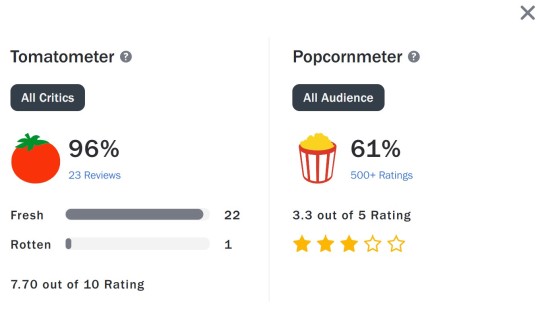
7.70 out of 10, and you give it a 96%? Then, 3.3 out of 5, and you give it a 61%? That 3.3 out of 5 comes from people not being able to rate something properly with numbers, it's a mix of 0/5 reviews and 5/5 reviews, it's not a fair number. The single negative critique of te 'critics' talks about how the series isn't really a homage to the original games has most likely not been read. Neither the rest — but who cares, most are positive, right? That's our nowadays issue. "I'm not reading all that" or "yapping" in our culture has done a lot of damage to critical thinking, and people acting as individuals.
If you understand Spanish well, I recommend this video in particular about reviews, and how all of them are fake, be them paid or not. Please, it's not a waste of time at all.
... About that last part, I do not feel that bad for the ones who got into it because of the rabbit. It's again, the same thing: so, regardless of how bad a series was, you find the fucking furry hot, so you don't care and praise the product anyways. You find a single thing of it good, and that already makes it the Holy Grail for you.
I don't think we have a solution for this. Not anymore, with how putrid our brains are nowadays. After all, it's easier to attack the people who demand a quality product, than the rich guy behind said product, isn't it?
#anti dmc netflix#anti netflix#< in general. really.#you people really don't have much respect for your money#a netflix subscription isn't free. search for other hobbies.#dunno. guess i was born too poor to pay for 4 different platforms at the same time and be able to go 'just let people enjoy things'#i hope you know that i will raise my children to eat your own <\3#dmc#devil may cry#nysus q&a
63 notes
·
View notes
Note
Hello! I really enjoy your art style and your comics! Your style is very unique, and makes what you make stick in my brain longer than most posts!
I was wondering about what your thoughts were on the Interns/junior agents in the second game?
Honest thank you. General Psychonauts 2 spoilers below. Nothing major.
My feelings on them weren't very positive at the beginning. I grew fonder of them throughout the game though. But after beating the game; Them, and many other aspects were revealed to just be that. They're okay, but nothing deeper. If I had to like any of them it'd be Sam, Adam, and Lizzie. I either forget, don't care, or dislike the others.
Although, while occasionally fun to draw and think about, they suffer from from not having anything extra about their lives to latch onto, like the campers. I like sticking to and basing stuff off of canon, and there is not much canon to write off of.
Mixed feelings on them as a whole, again. I find the hazing they did to Raz a bit silly. In a negative sense. How old are they? Teenager or Adult? Doesn't matter much. At any age I can't imagine doing that to someone. Nevertheless a kid instead of someone your age. Call me new-fashioned, but I think its cruel and unusual. I don't find the scene after funny either. It's a bit weird to sit through.
And characters don't have to always do morally good actions. Doing the opposite doesn't make a character bad. I just don't see why/how we're supposed to ever like them afterwards. I don't understand how they ever get along or "become friends" with Raz. Remembering this detail really sours my opinion of them all. Unless I'm recalling wrong. Even if they aren't friends by the end, they're still at least a bit chummy. If I was Raz, I'd never interact with them again if I didn't have to.
But I'm not Raz. And he can do whatever he wants. This self-disrespecting, approval seeking kid. A kid who thinks that if he impresses the people older than him he'll be treated on their level. A kid who believes that he if he just proves himself, they'll treat him like a regular human being. And that's not unrealistic. He's 10 after all. But it makes me sad.
I enjoy these asks, really. But letting you all know now, many aspects solely about Psychonauts 2 I am not the biggest fan of. I love Psychonauts, I just think many new aspects of the sequel are contrived or boring. Not that people can't or shouldn't be fans of the stuff! Just please don't expect too much here.
I actually have a mild comic written and drafted out about them. Hasn't been worked on in a while.
71 notes
·
View notes